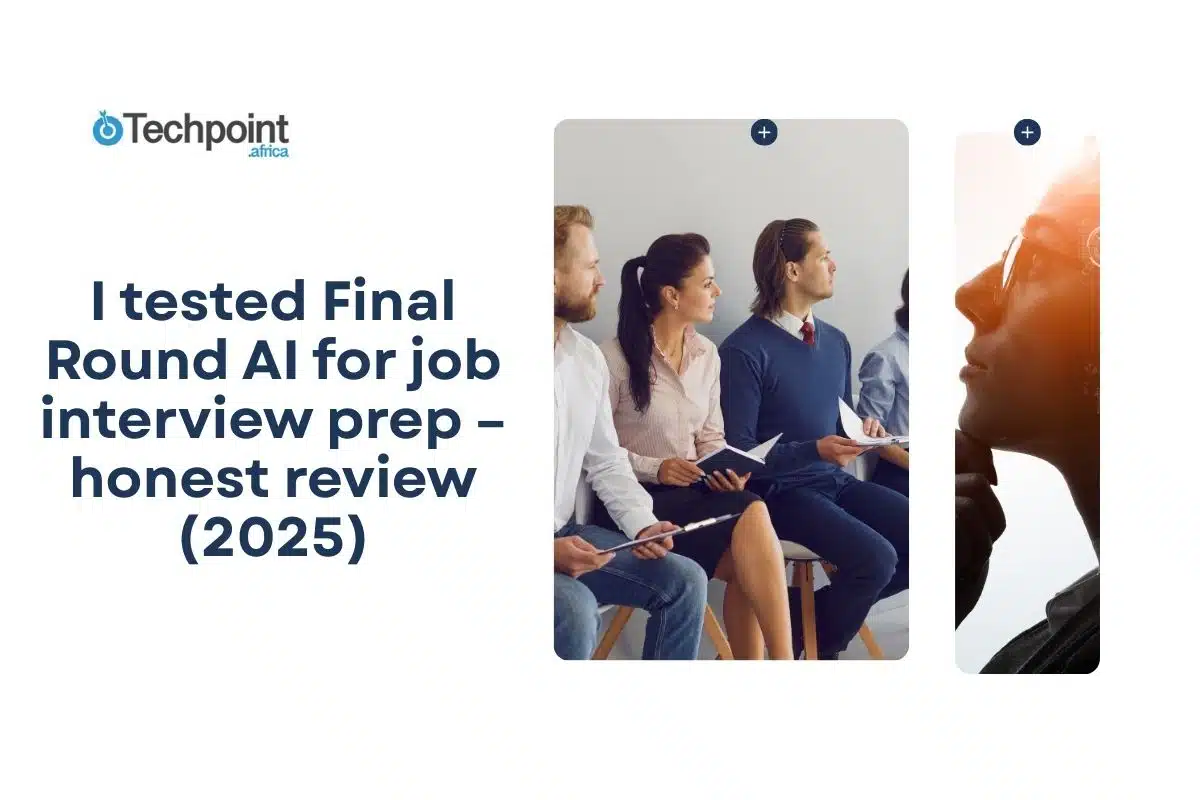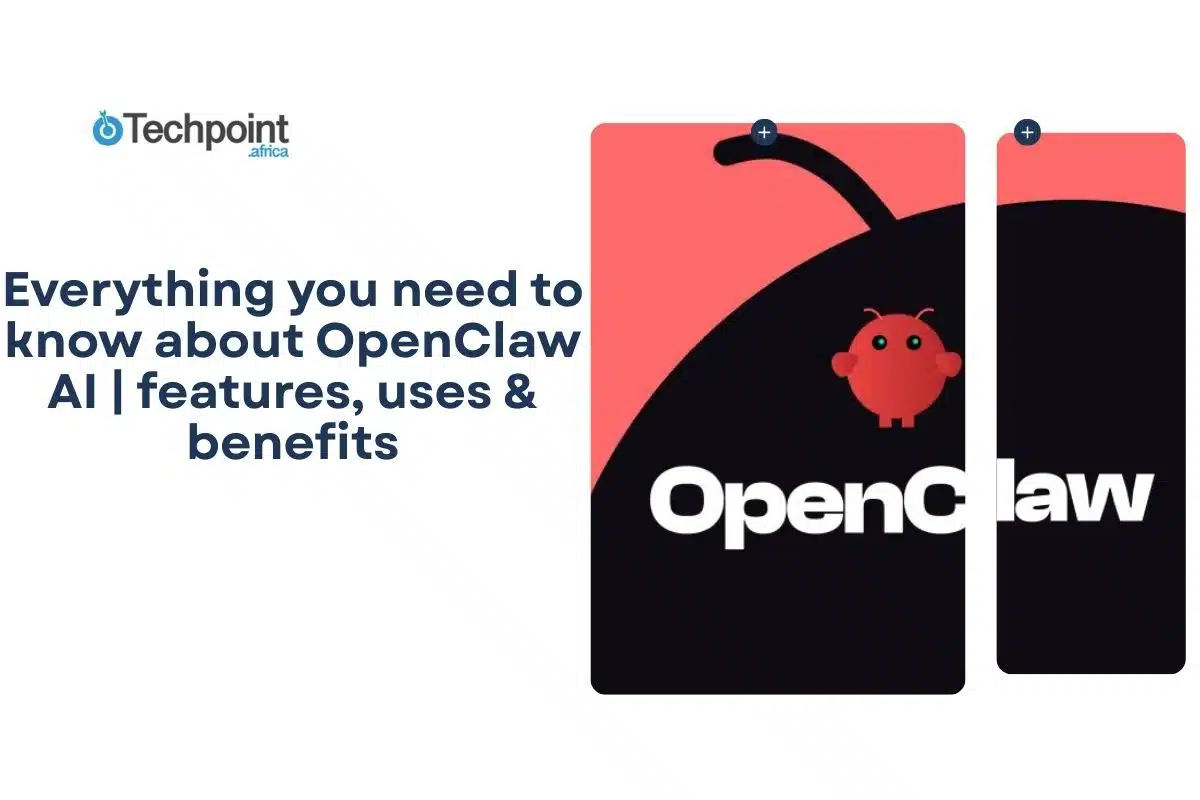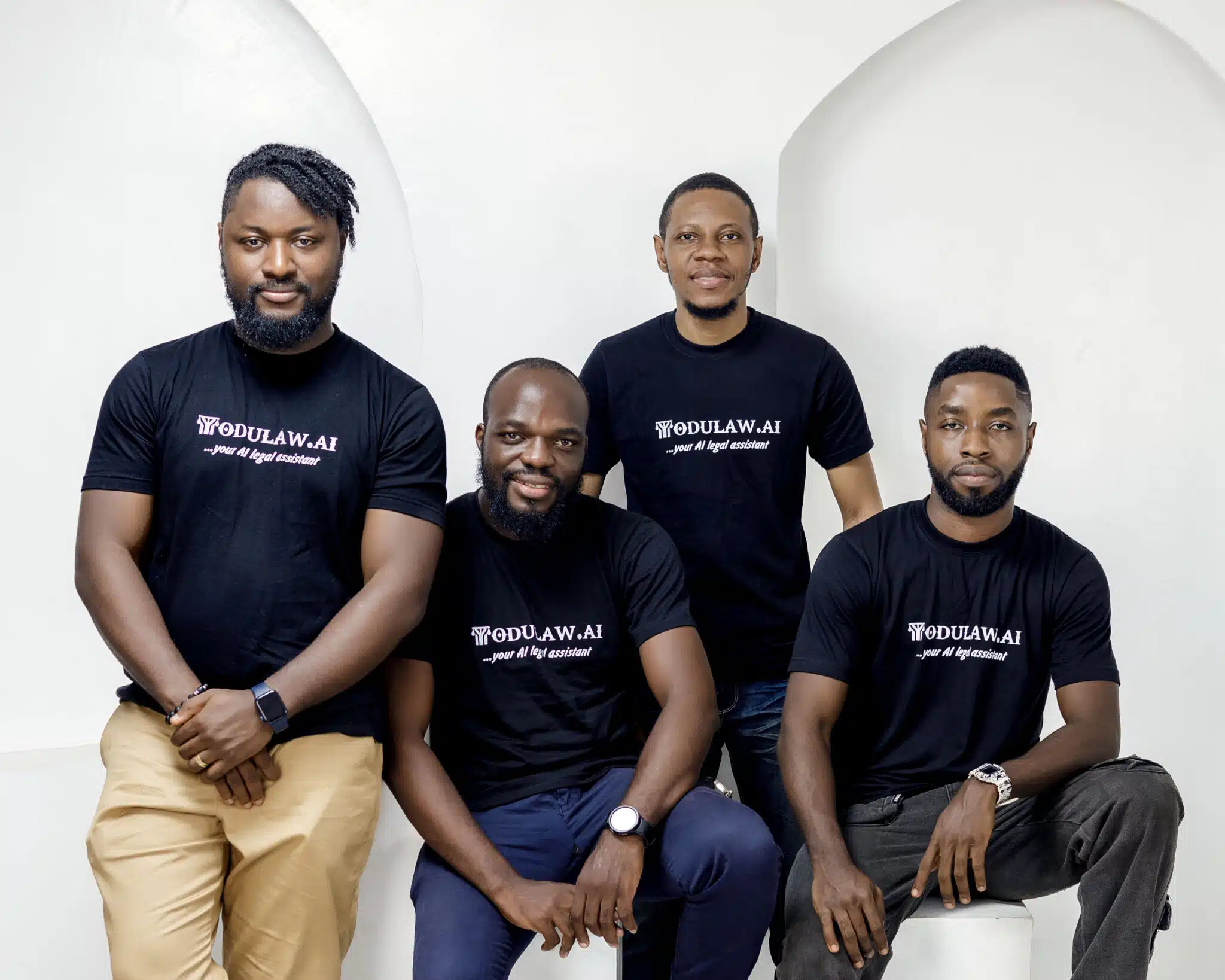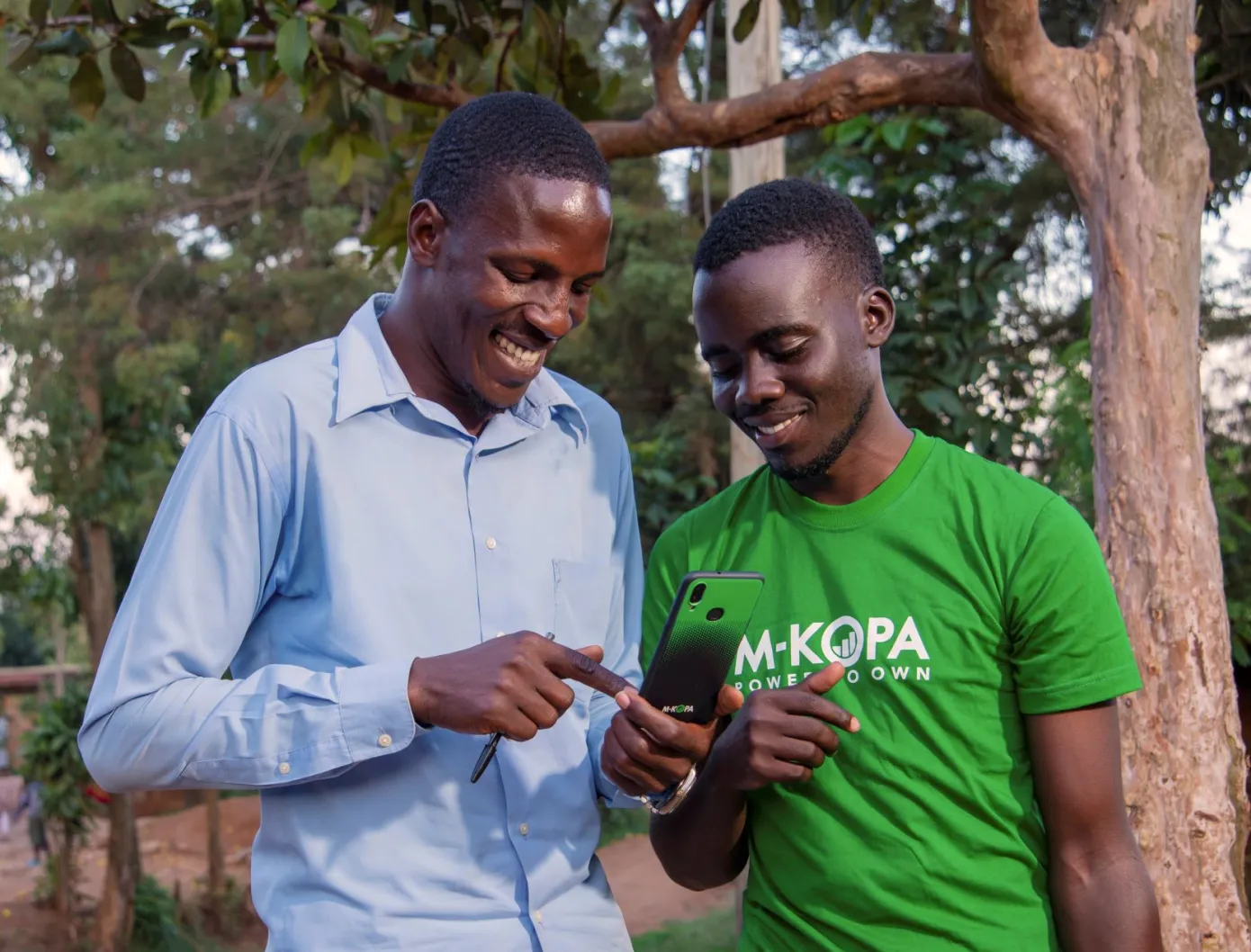Job interviews are wild.
You prep like hell, rehearse the best answers, convince yourself you’re ready, then they hit you with a curveball: “Tell me about a time you faced failure and how you handled it, yourself, and a team (if you had one).”
I’ve been there more times than I care to admit. Smart, qualified, and well-prepared, yet interviews still manage to bring a special kind of anxiety. Especially when you’re job hunting, juggling multiple roles, and trying to sound passionate without overselling. It’s a whole performance.
So, when I found out about Final Round AI, I was instantly curious. It promises to be your AI interview coach, one that doesn’t judge you, lets you practice endlessly, and gives real feedback without the awkward human awkwardness.
And as someone who geeks out over AI tools (this review is part of an ongoing series where I test them hands-on), I had to try it out. In the past, I’ve tested AI tools for writing resumes, including creating 100 ChatGPT prompts for crafting a winning resume. But Final Round AI promises to handle the whole job-searching process.
I should let you know that I’m not some career coach or LinkedIn thought leader. I’m just a regular person who gets nervous before interviews, and I wanted to see if an AI could help me feel more prepared. This is my honest experience after using Final Round over a few days: the good, the bad, and the moments I had to ask myself, “Wait, am I getting interviewed by a robot right now?”
TL;DR: Key takeaways from this Final Round AI review
- Final Round AI is a full-suite interview prep platform, with tools for resume writing, mock interviews, LinkedIn optimization, and real-time coaching during actual interviews.
- The Interview Copilot was my standout feature. It quietly supports you in live interviews with transcription, structure prompts, and even coding help. Game-changer.
- Resume builder and auto-apply tools saved me hours. Tailored bullet points, job-matching, and optimized applications, all streamlined.
- Mock interviews felt real. You get instant feedback on tone, delivery, and body language. Bonus: it adapts to your role or industry.
- It’s best for job seekers, students, career switchers, remote applicants, and anyone tired of winging interviews alone.
Understanding Final Round AI?
What is Final Round AI?
If you’ve ever stared blankly at a Google Meet screen while listening to your interviewer, wondering if your answers sound smart enough, the makers of Final Round AI get it. They made this tool to help you prep like you’ve got a personal coach on speed dial, but with less pressure and more machine learning.
At its core, Final Round AI is an AI-powered interview assistant that offers a suite of tools for job seekers. You get access to:
- Mock interviews with real-time feedback.
- On-the-fly transcriptions and summaries.
- Role-specific interview scenarios for over 100 positions (think product managers, marketers, developers, data scientists, finance analysts, and more).
- AI resume help, question banks, and bite-sized career resources like blogs and walkthrough guides.
It’s part career therapist, part coach, and part brutally honest robot, depending on how you use it. The platform launched in August 2023, founded by Michael Guan and Jay Ma, and it’s still very much in its early growth stage. But it’s gunning for that “one-stop shop for job seekers” title.
For someone like me, juggling curiosity, career anxiety, and a mild addiction to testing new AI tools, Final Round felt like a no-brainer to try. But, full disclosure: my excitement didn’t last long without a few raised eyebrows.
How does Final Round AI work?
It’s pretty straightforward.
You choose a role you’re preparing for (like Product Manager or Data Analyst), then start a mock interview. The AI asks you relevant questions, listens to your response in real-time (via text or voice), and provides instant feedback that covers everything from filler words and answer structure to tone, pacing, and even eye contact if you have your camera on.
There’s also a resume analyzer, a bank of role-specific questions, and a section for AI summaries that break down your responses and offer suggestions to improve. It’s like training for the big leagues, but instead of sweating in front of a recruiter, you’re doing it with a robot that doesn’t judge.
Final Round AI at a glance
| Developer | Michael Guan & Jay Ma (Final Round AI Inc.) |
| Year launched | August 2023 |
| Type of AI tool | Career prep and AI-powered interview coaching |
| Purpose | Help users practice, refine, and succeed in job interviews |
| Platform availability | Web only (desktop + mobile responsive) |
| Top 3 use cases | Mock interviews, resume feedback, and question bank exploration |
| Who can use it? | Job seekers, career switchers, students, professionals, and interviewees |
| Starting price | Free plan available; paid tiers unlock more features |
| Free version | Yes, with limits on the number of sessions and feedback depth |
Final Round AI language and platform support
Final Round AI currently supports only English, so if you’re planning to prep in another language, not yet. The founders say multilingual support is on the roadmap, but for now, English is your best bet for mock interviews, resume feedback, and AI coaching.
As for platforms, Final Round AI is fully browser-based, meaning:
- It works on Chrome, Firefox, Safari, and other browsers.
- It’s compatible with Windows and macOS.
- It’s mobile-friendly, so you can practice on your phone (no native app yet, though).
No software to download, no fussy installations. You just sign in and start prepping. It’s smooth enough that several users have reported doing a few mock interviews from their phone in bed.
Major benefits of Final Round AI
After spending several days with the platform, here are the standout perks that made a difference for me:
- Real-time AI interview coaching. It listens while you talk and gives feedback as soon as you’re done. It points out filler words, pacing issues, and whether you’re rambling or staying on track.
- Role-specific question banks. Whether you’re applying for a PM role, marketing analyst, or software engineer, Final Round pulls questions tailored to your role. No more generic “Tell me about yourself” on repeat.
- Mock interview mode. The experience feels eerily close to a real interview. You get asked a question, you respond, and then you get a full breakdown: tone, clarity, and structure included.
- Instant resume analysis. Upload your resume, and the AI will give actionable suggestions. I got feedback on specific bullet points, clarity, and phrasing.
- Visual and written feedback. It doesn’t just tell you what’s wrong; it shows it. You get transcripts with underlined filler words, highlight boxes for long pauses, and side-panel notes with recommendations.
- Helpful resources built in. There’s a growing library of interview guides, resume tips, and industry-specific advice tucked right inside the platform. Great for when you need a quick sanity check before an interview.
Getting started with Final Round AI
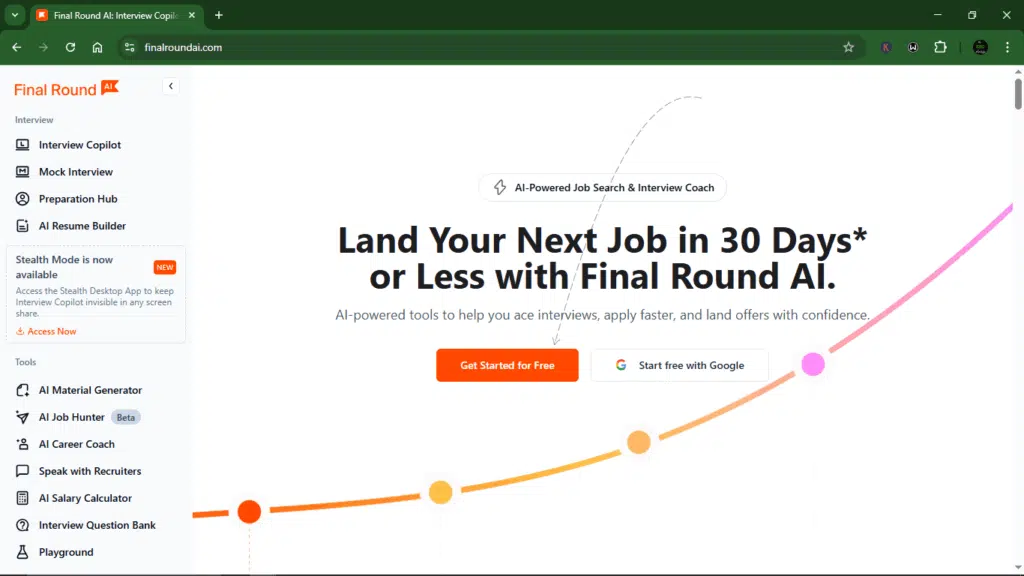
Sign-up and onboarding experience
I accessed Final Round AI through Chrome, ready to see what it had to offer. Right there on the homepage, I was met with two big buttons: “Get Started for Free” and “Start Free with Google.” I went with the Google option, anything to avoid typing in another password.
Right after that, the onboarding journey began. And let me tell you, it wasn’t short.
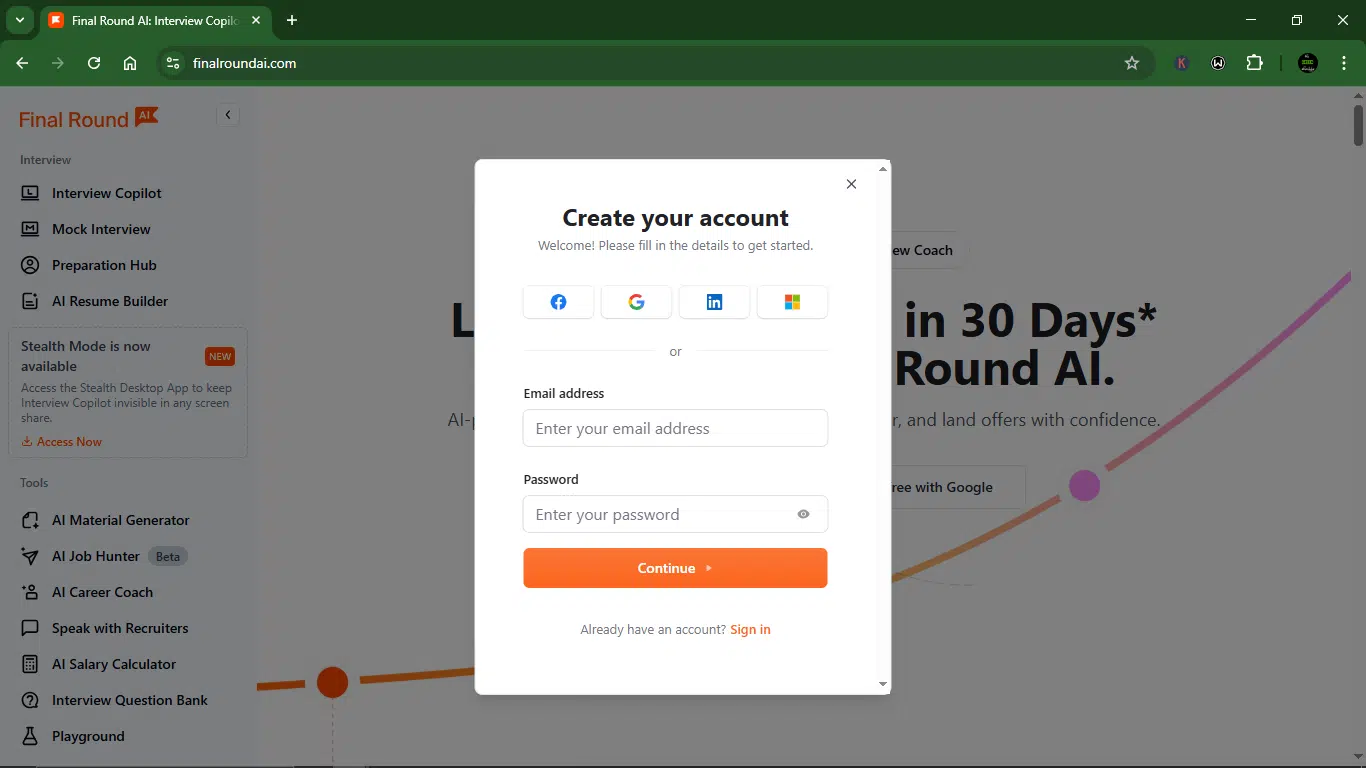
The first screen asked what I was hoping to use the tool for. I picked the second option, something around interview practice, and that kicked off a four-step sequence:
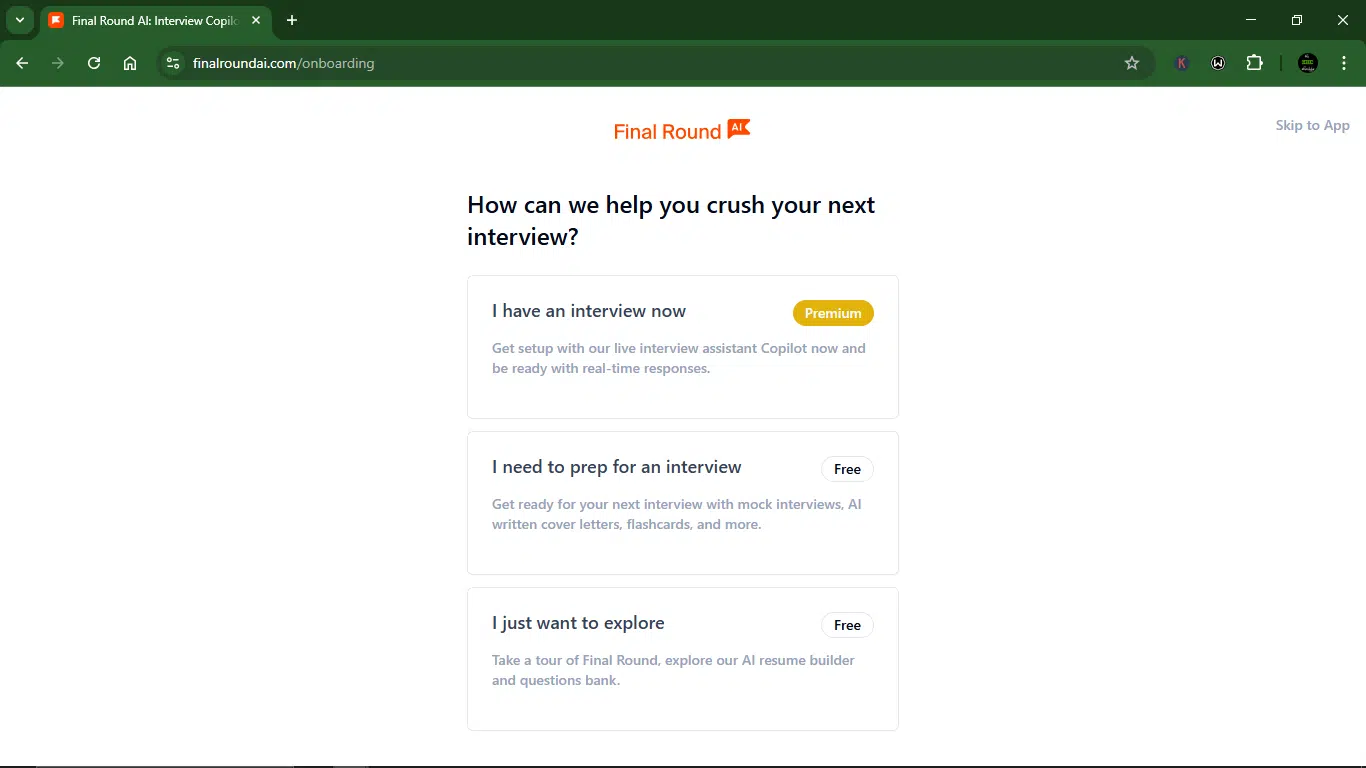
First, it wanted to know my target company and desired role. (Shoutout to the folks still dreaming of Google or McKinsey, you’ll feel seen here.)
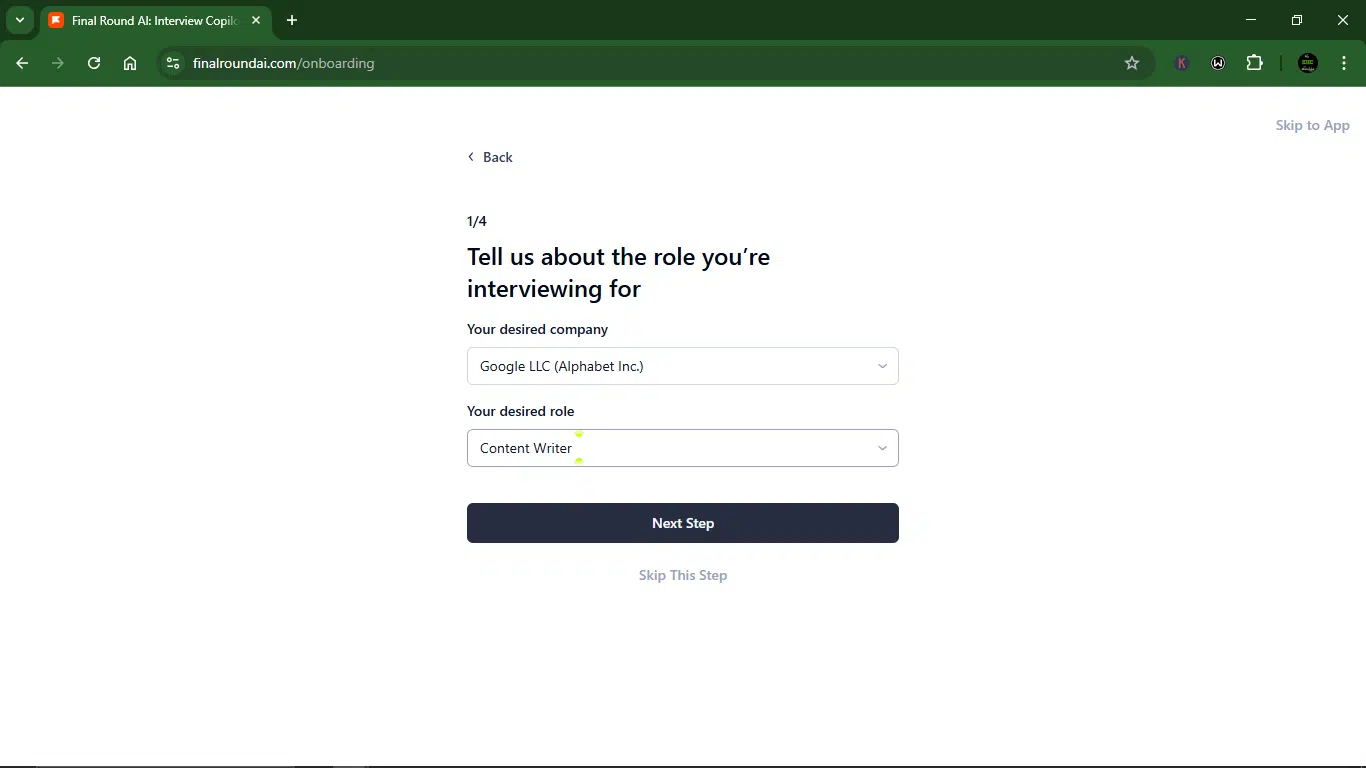
Next, it asked me to upload my resume. Fair.
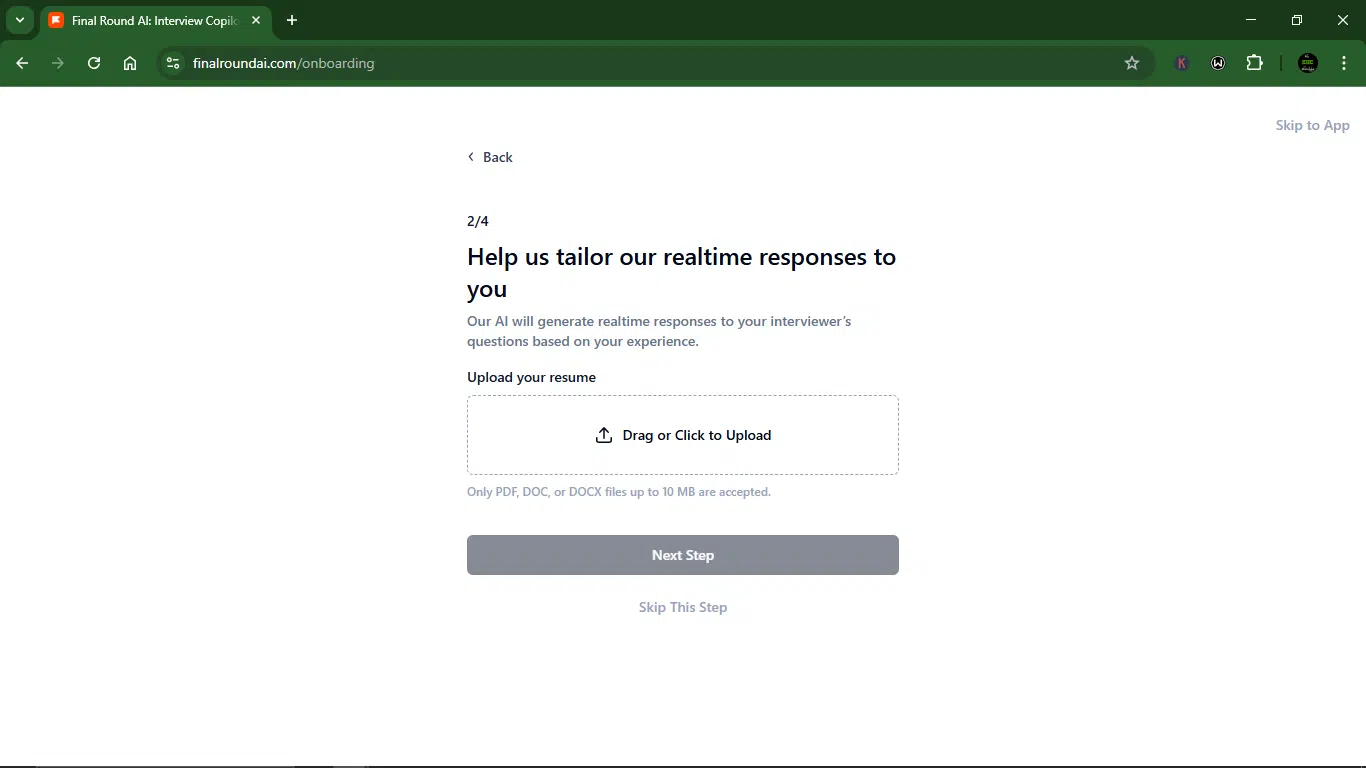
Then came a permission check screen, standard stuff, mostly about how the tool can access and process your inputs.
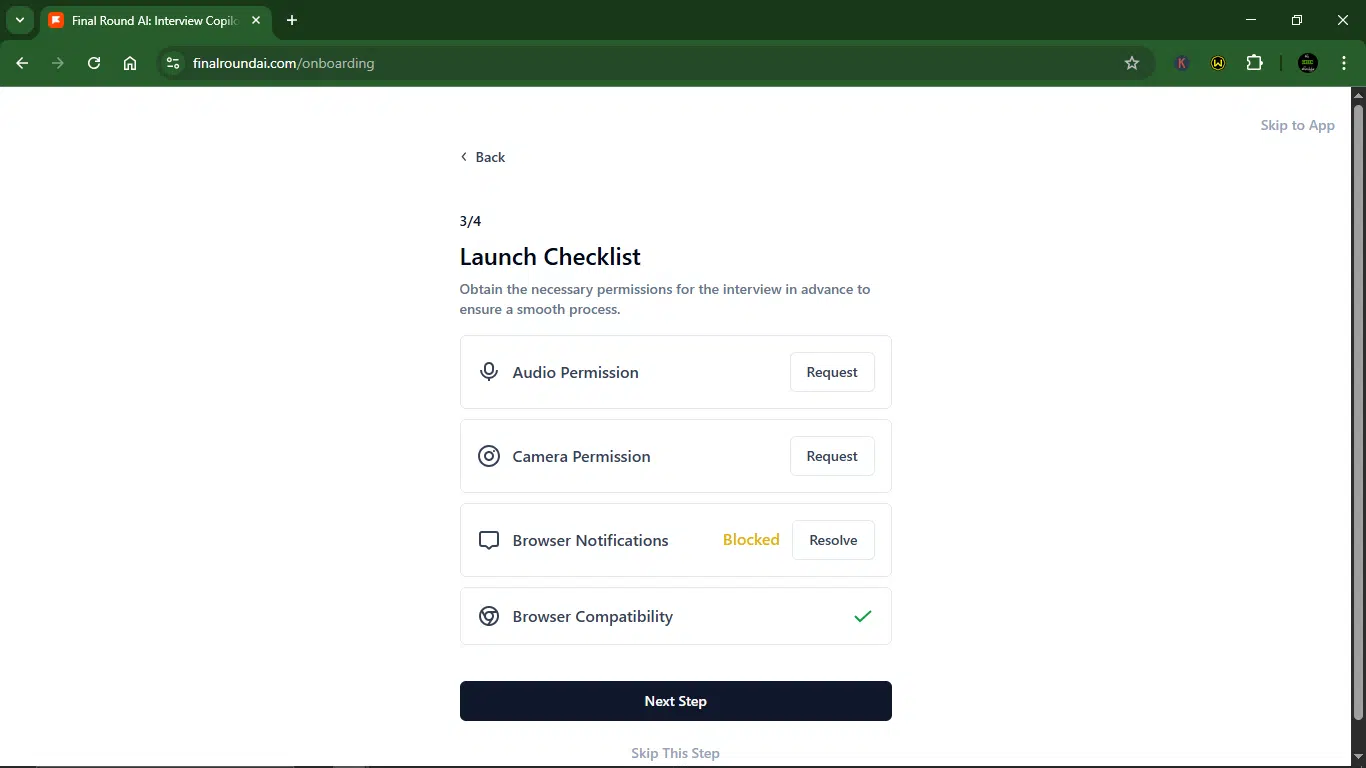
Finally, the system spun up and launched.
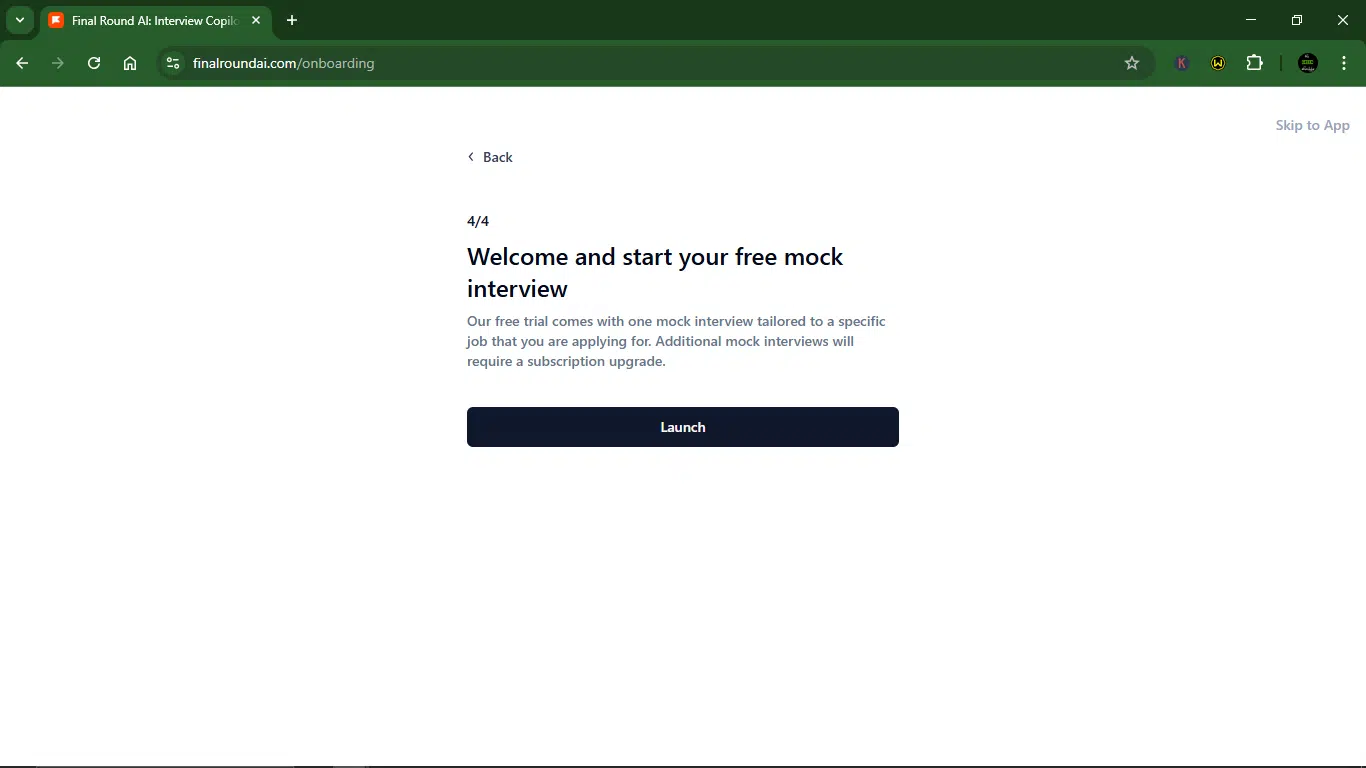
I was thrust straight into a live mock interview. No warm-up, no “Are you sitting comfortably?” Just a question and a blinking mic. It was kind of jarring but also refreshing.
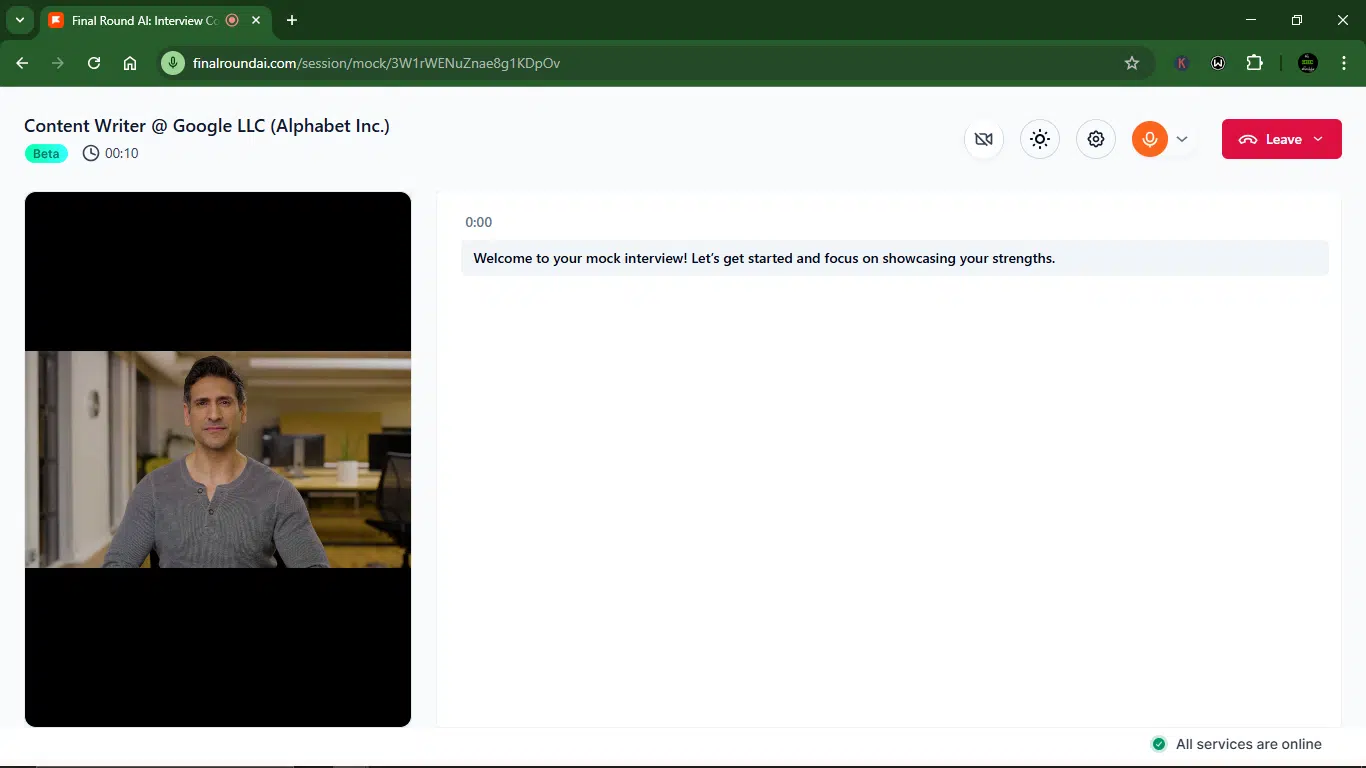
From there, I landed on the Final Round AI dashboard, which looks like a minimal control panel. Features were lined up neatly on the left: Interview Prep, Resume Tools, Career Tracker, and more. Clicking into each expanded more options.
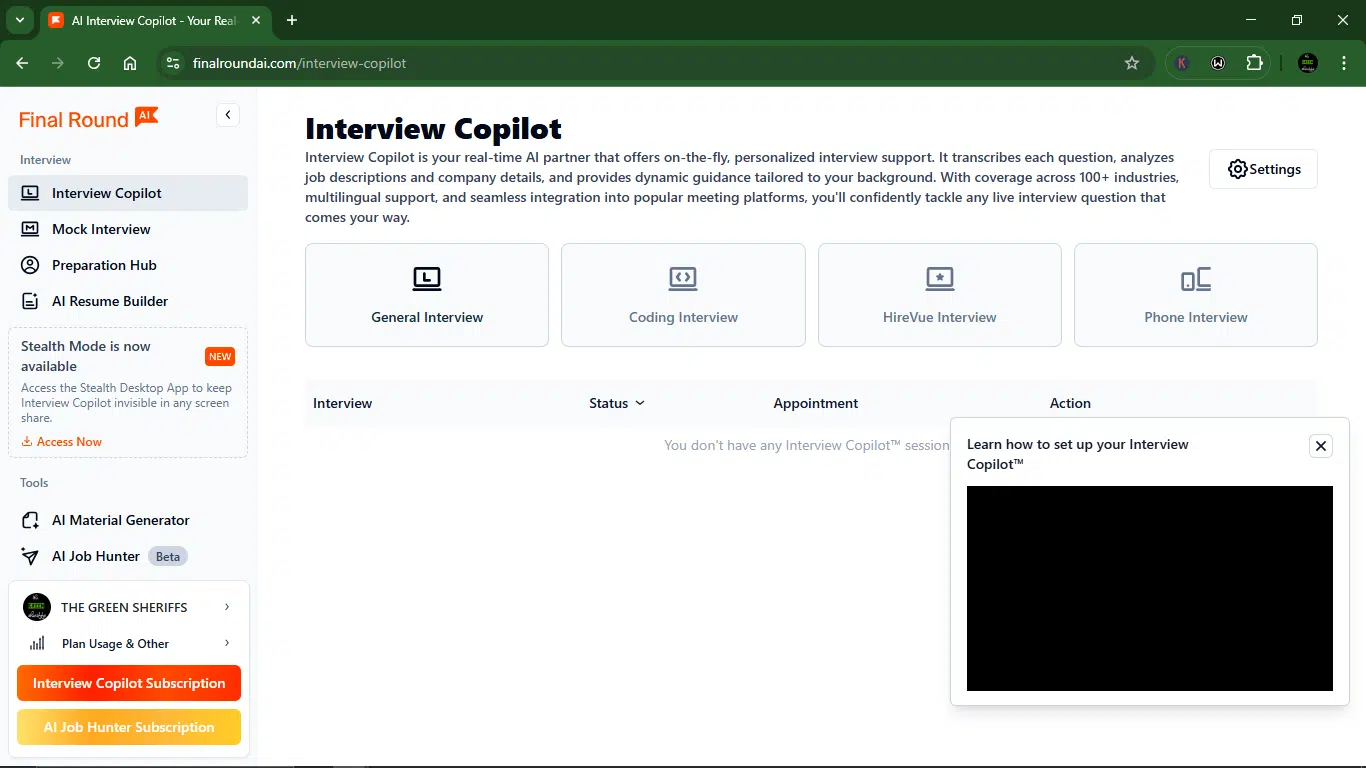
Overall, signing up was painless. But the onboarding process dragged a little, especially if you’re just trying to jump in and test the waters. Still, once I was in, it felt like I had access to a solid set of tools, and I was curious to see what they could do.
Interface
From the moment I stepped into Final Round AI’s interface, I got the sense that this wasn’t one of those over-engineered, over-hyped platforms. No flashing banners. No overloaded dashboards. Just clean lines, warm colors, and tools that feel like they want to help you.
After uploading my resume and selecting my target roles, the system generated a personalized prep plan within minutes. And not just generic tips, either. It gave me structured tasks and interview drills tailored to my industry and level.
But here’s what genuinely impressed me: the Interview Copilot. It’s like having a career coach quietly sitting in the corner during your interview, offering real-time nudges, reminders, and even post-interview feedback. No judgment, just subtle support.
Design-wise, Final Round AI walks the walk. The white-and-coral-orange color scheme is modern and easy on the eyes, while its typography and layout feel carefully considered. I didn’t have to go digging for anything as the tools are neatly stacked in the sidebar, and everything just flows.
Even tiny things added up: smooth transitions, zero lag, and absolutely no annoying pop-ups. It’s weirdly calming.
How easy it is to use Final Round AI
Honestly, yes.
Final Round AI is intuitive, even if you’re not techy. The experience feels guided without being restrictive, and every tool comes with enough micro-explanation that you rarely feel lost. Whether you’re updating a resume, doing a mock interview, or asking the AI to simulate recruiter questions, it’s frictionless.
If I had to rate the interface and usability, I’d give it a solid 4.2 out of 5. The only reason it’s not a full five is because there’s room to tighten the onboarding flow and maybe simplify a few deeper features for total newbies.
But overall, Final Round makes a strong first impression. It’s got that rare balance of simplicity and substance, and in the job-hunting world, that’s gold.
Key features I explored in Final Round AI
Over several days, I got to know Final Round AI quite intimately. It wasn’t just a one-time demo; I genuinely tried to make it part of my job hunt routine. Here’s a breakdown of the features I explored and how they performed in real-world use:
1. AI resume builder
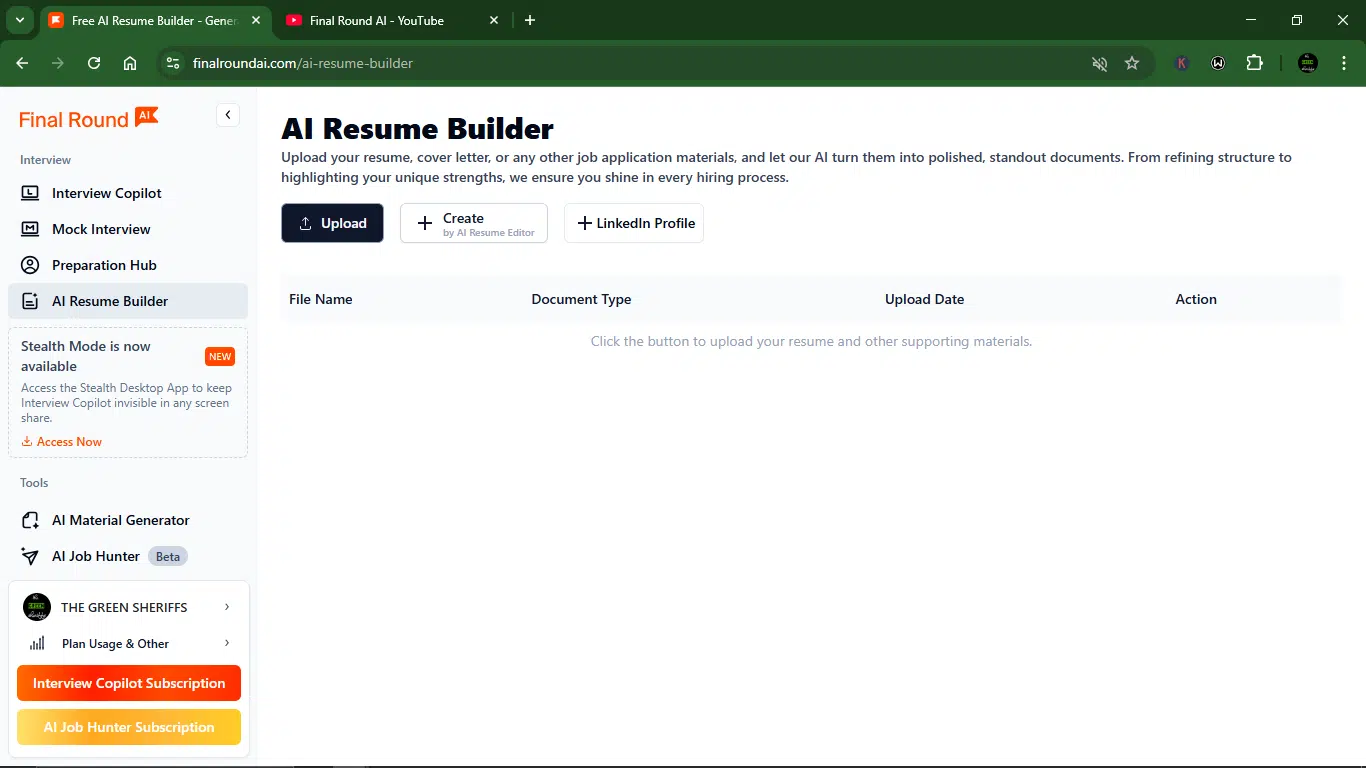
This was my warm-up. Final Round’s resume builder isn’t one of those generic fill-in-the-blank tools. It scans job descriptions and rewrites your resume bullet points to match what recruiters and applicant tracking systems are scanning for. I ran my resume through it before applying to five companies.
It does make the CV prettier. But even better, it helps you rephrase dull lines into impact-driven statements that feel like you, just sharper.
2. Mock interview mode
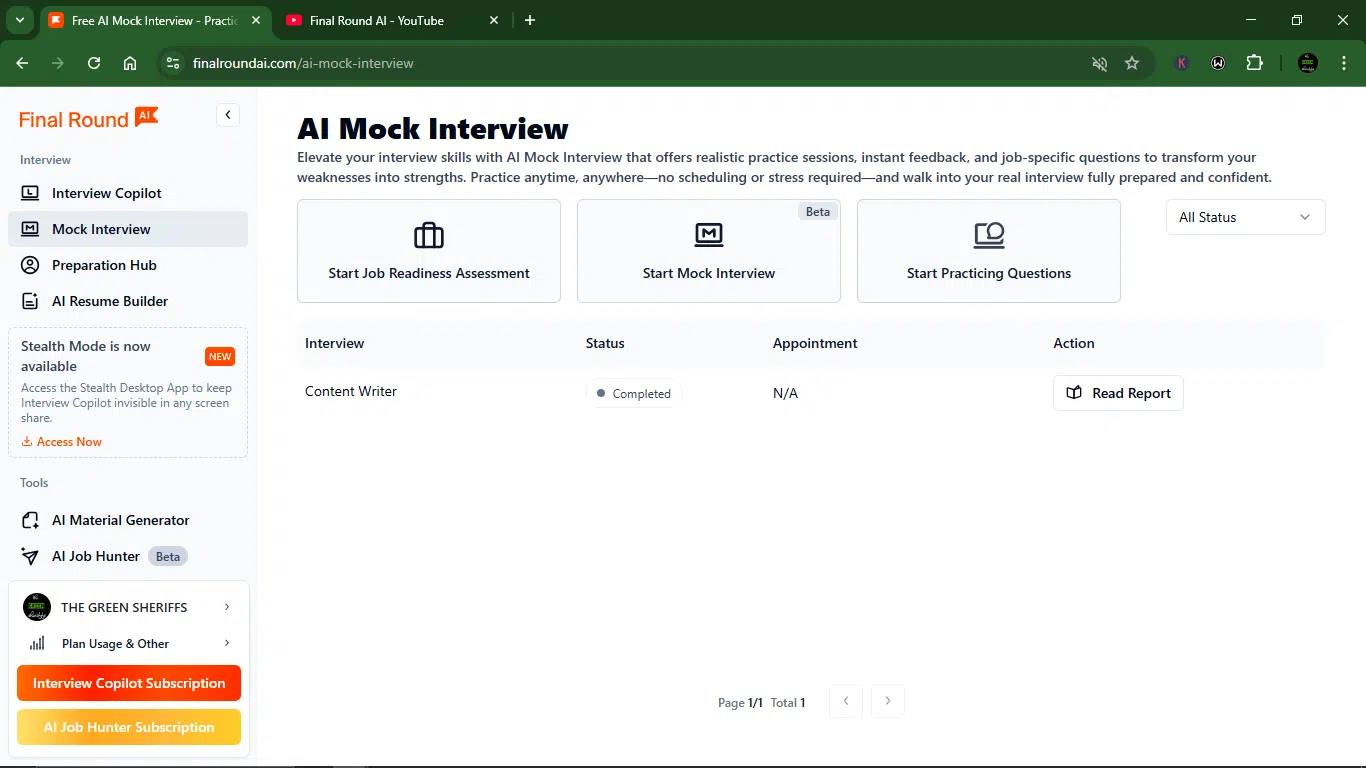
This was the real deal. I used the mock interview mode to simulate both technical and behavioral interviews. The AI adjusted its tone and question style based on the job I picked (content marketing in my case). It even offered post-interview analytics, tracking pacing, tone, clarity, and whether my answers made sense.
What I appreciated most was the ability to ask it to “be tougher.” It pushed me the way a real interviewer might, without the actual sweaty palms.
3. Interview Copilot
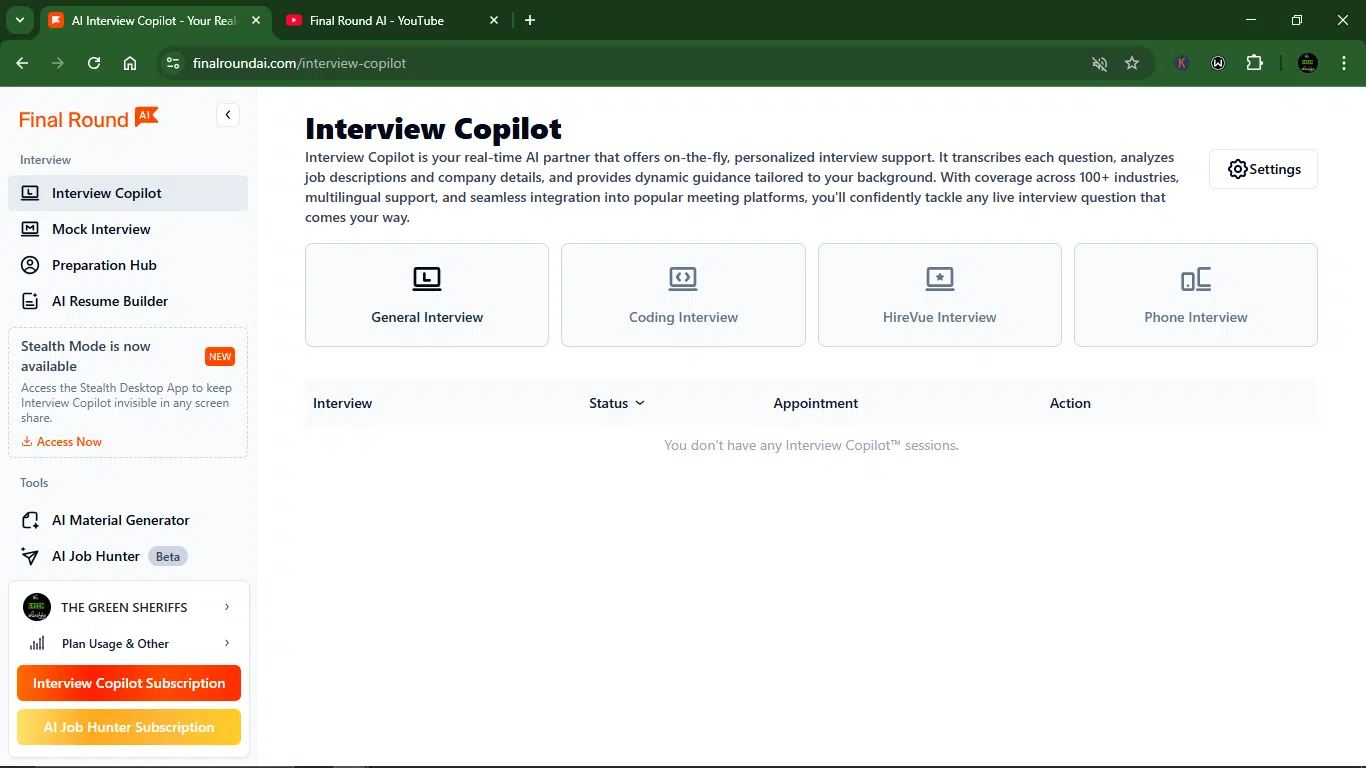
This one’s a game-changer. Interview Copilot quietly sits in your browser, listening during your real or mock interview (with your permission, of course). When you need it most, it gently offers bullet points or suggestions, like structure prompts or reminders to hit certain keywords.
In one mock technical interview, it nudged me with a STAR framework breakdown just in time. I restructured my response on the fly, and even I was impressed with myself.
4. AI career coach
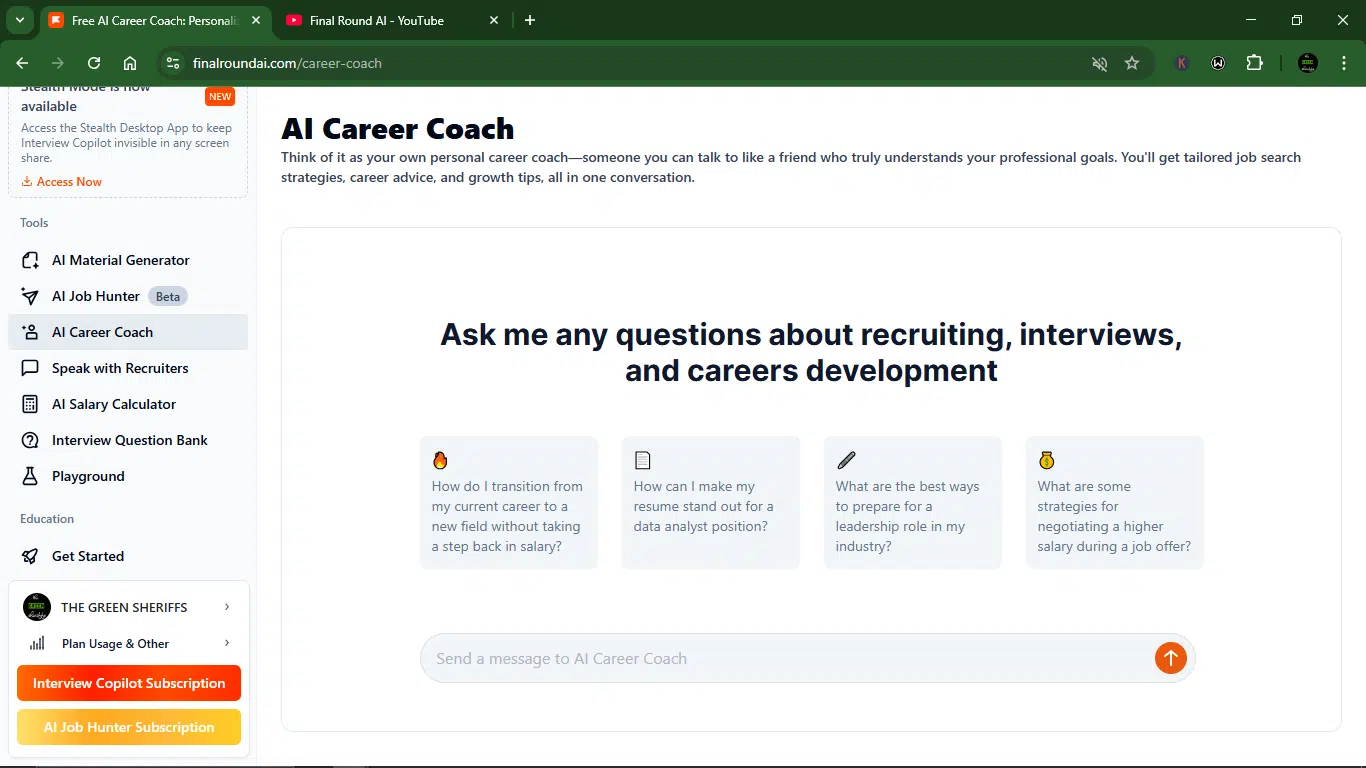
Think of this like a personal trainer, but for your career. Final Round’s AI coach helped me set goals, stay consistent, and even plan small daily tasks during the week. On days you might feel drained or discouraged, it’ll give you the structure and accountability you need to keep moving.
5. Auto apply
Job hunting feels like copy-pasting your resume and cover letter into a black hole. The auto-apply tool changed that. Once I uploaded my resume, Final Round AI started scanning listings that matched my background and pre-filled applications tailored to each job. It even included customized cover letter snippets. I still had to review them manually, but the time I saved was massive.
6. LinkedIn profile optimizer
I thought my LinkedIn was decent until this feature roasted it (gently). It highlighted weak spots in my headline and summary and offered optimized versions filled with relevant keywords. If you use it, it can help you tweak your profile. Some users have said their profile visits and recruiter messages increased noticeably.
8. Interview analytics and sentiment assessment
The real-time feedback here was surprisingly nuanced. It assessed clarity, tone, structure, and even how confident I sounded. I got insights like: “Your response was clear, but lacked specific examples,” or “You sound tentative, consider rephrasing with more assertive language.”
7. Interview report
Every interview (mock or real) comes with a personalized report. Not just the regular “you did well,” but a proper breakdown of what worked and what didn’t.
For example, it flagged my communication style as too vague and suggested being more specific with metrics and examples. That report helped me improve fast because it showed me what I couldn’t see on my own.
9. Non-verbal communication analysis
For video interviews, it evaluated my eye contact, posture, facial expressions, and hand gestures. This might sound excessive, but it was super useful. I had no idea how much I fidgeted or looked away while talking until it flagged it. It made me more intentional about how I show up visually, not just verbally.
10. AI-powered custom question bank
Last but not least: the custom question bank.
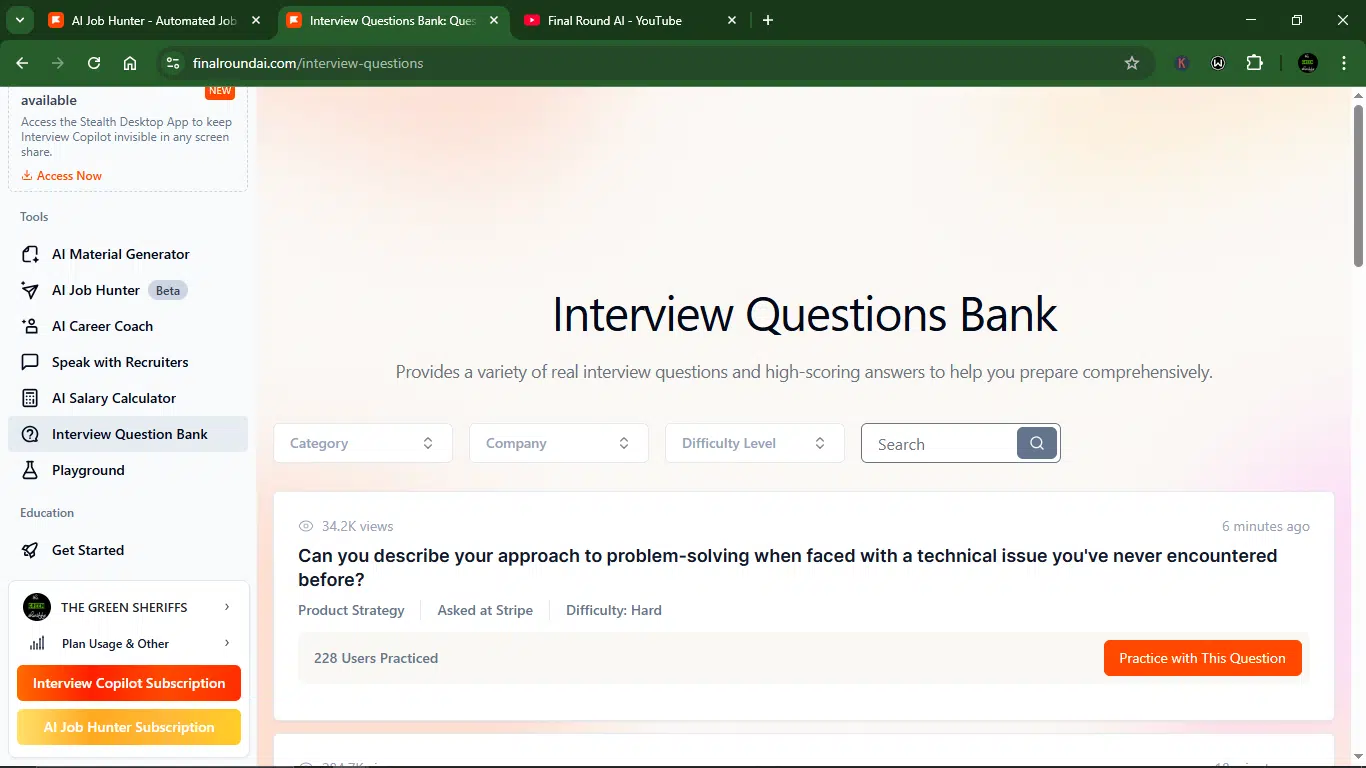
It came preloaded with industry-specific, behavioral, technical, and case-study questions, but I could also add my own. So if I knew a company was known for a particular line of questioning, I could prep for it specifically.
This dual system, preloaded plus custom, meant I could practice both broadly and deeply. For someone aiming at niche roles, that’s priceless.
How to use Final Round AI (step-by-step)
If you’re wondering how to use the platform for interview prep, here’s the simple path I followed:
Step 1: Sign up and create your profile
Head over to finalround.ai and hit “Get Started.” You can sign up using Google or a good old email. I went with Google because I didn’t want one more password to remember.
Once you’re in, you’ll fill out a few quick questions about your career goals, target roles, and industries. You’ll also upload your resume (don’t overthink it, you can always update later). This is what powers your personalized suggestions.
Step 2: Pick your interview type
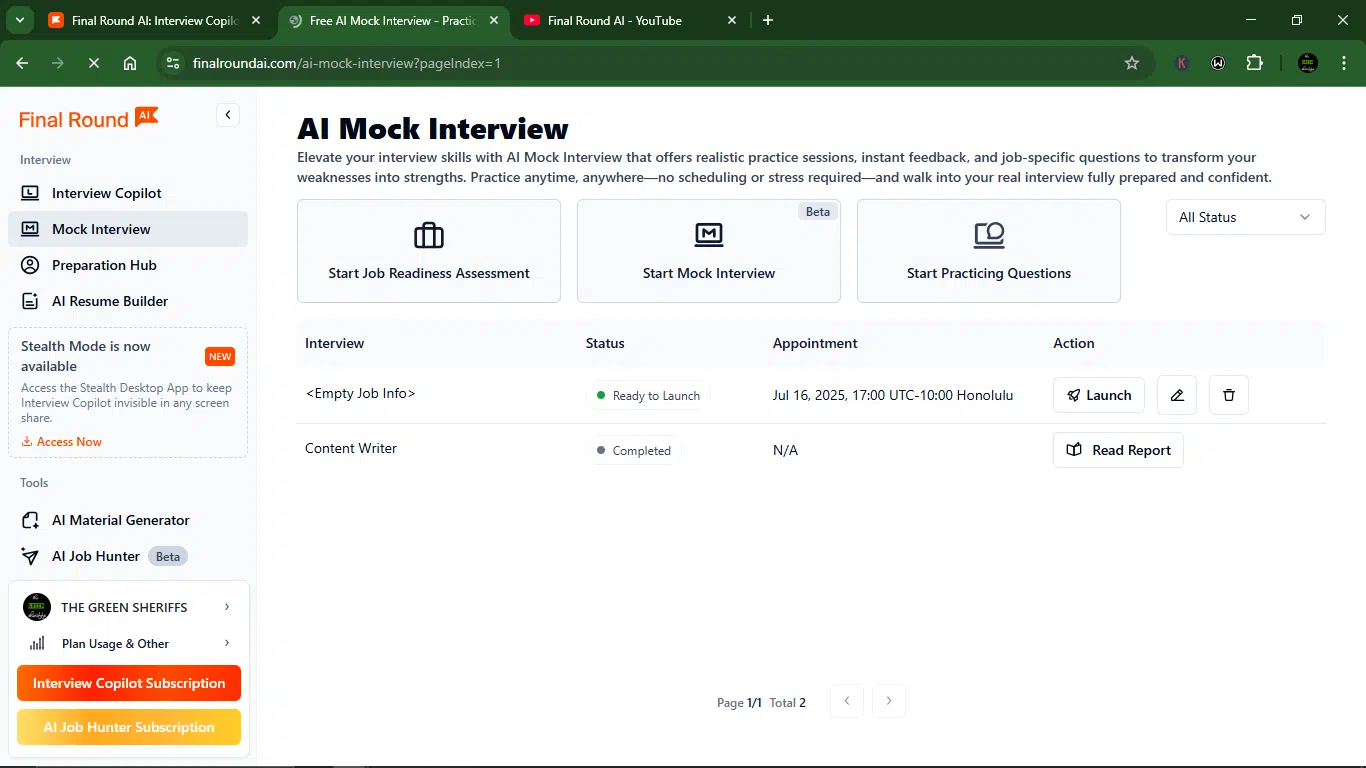
Next, you’ll choose what you want to start with: kick off the job readiness assessment, practice questions, or start a mock interview properly. You can also select from a wide range of roles: product management, marketing, finance, software engineering, consulting, and more. Basically, it sets the stage for a mock interview tailored just for you.
Step 3: Add the details
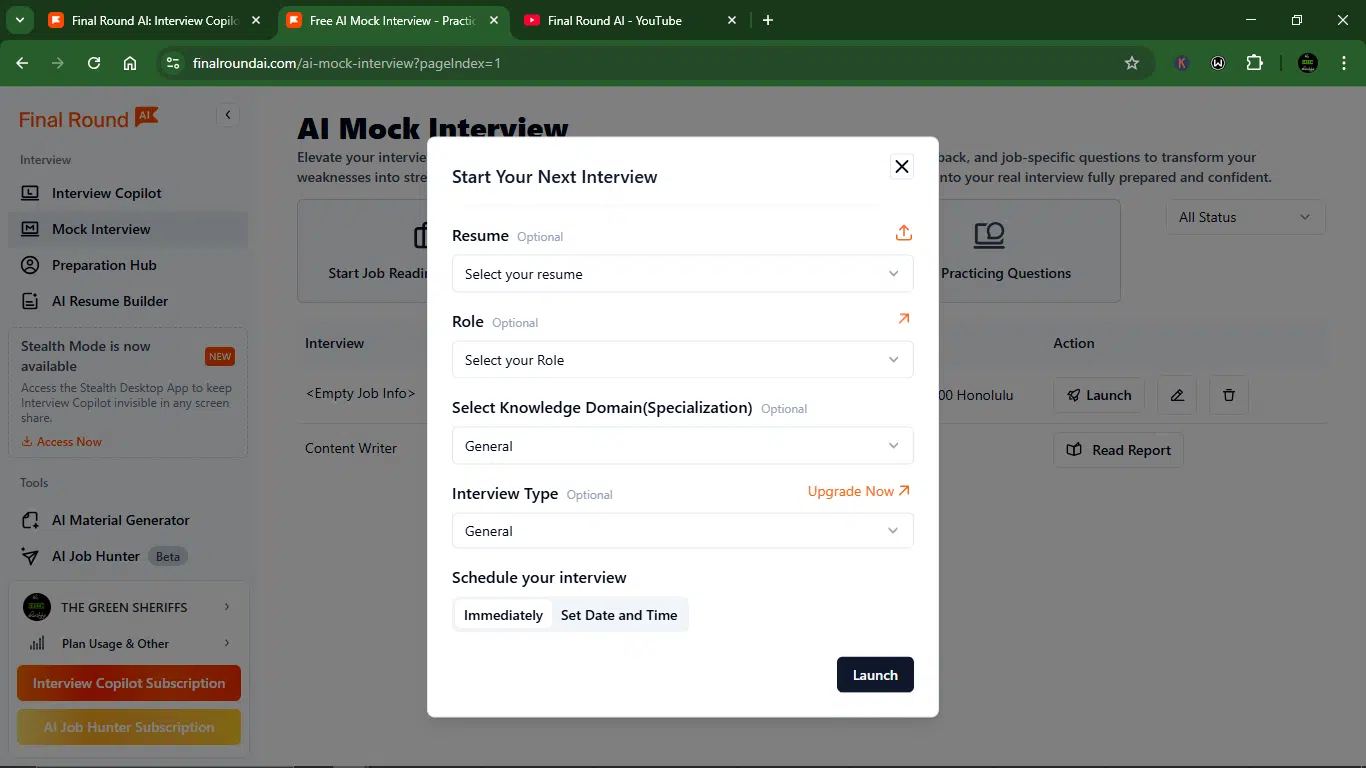
Here’s where the real magic begins. You can customize your session by selecting the AI model, your job title, company, and even uploading an updated resume if needed. It also asks for access permission (like mic and camera, if you want to speak aloud), and then you’re good to go.
Step 4: Practice your interview
Now comes the fun part, the simulation. You’ll get questions based on your selected role, and you can either type your answers or speak them out loud. The system listens, analyzes, and gives real-time feedback. It’s like practicing in front of a mirror, except smarter and less awkward.
Step 5: Get feedback and analyze
After each session, Final Round gives you a full breakdown: how confident you sounded, how clear your answers were, and how well you stuck to the point. It flags both your strengths and your weak spots (mine was rambling too much on “Tell me about yourself”).
Step 6: Repeat until you feel confident
Once you’ve reviewed the feedback, you can redo the same session or try a different one entirely. I found that doing this daily for a few days helped me feel sharper and more structured in my real interviews.
My hands-on experience with Final Round AI
I split my testing into three phases, mirroring the natural stages of a job hunt. Each phase answered a key question I had about Final Round AI.
First phase: Getting ready for a job interview
I already had a few interviews lined up, so it felt like the perfect opportunity to put Final Round AI through its paces. Now, if you’ve ever had to prep for a serious job interview, you know how intense that “preparation window” can be: tailoring your resume for every role, Googling potential interview questions, practicing answers in your head (or to your mirror), and hoping it all sticks.
I’ve done this routine more times than I care to count. And while I’ve landed a couple of offers this way, job hunting is rarely a one-and-done situation. It’s an ongoing game, and that’s what made this review feel personal. I wasn’t just testing another tool; I was looking for a smarter, more sustainable way to handle the process.
Tweaking my CV with the AI Resume Builder
This was my first time using an AI resume builder, and let’s just say, it was nothing like those generic “plug in your info and pray” generators. Final Round AI’s resume builder felt closer to a guided resume assistant.
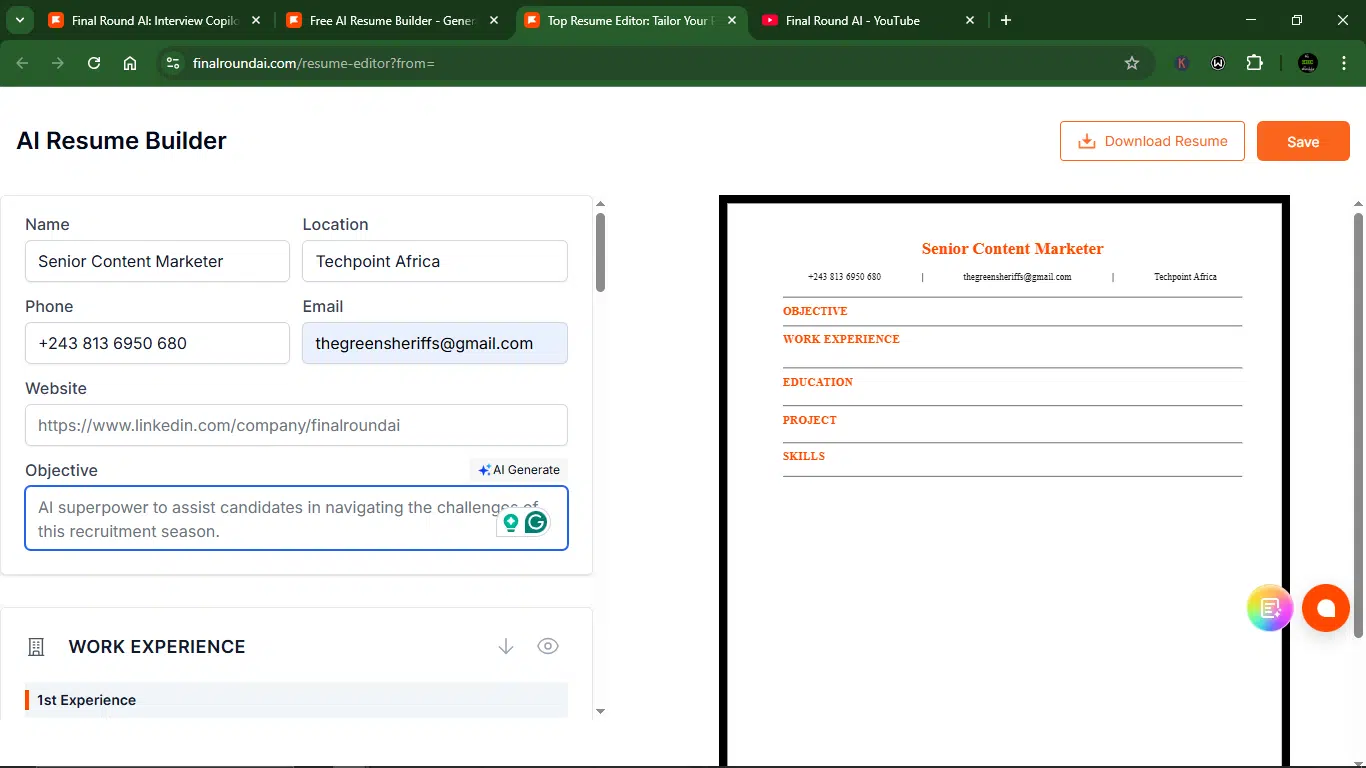
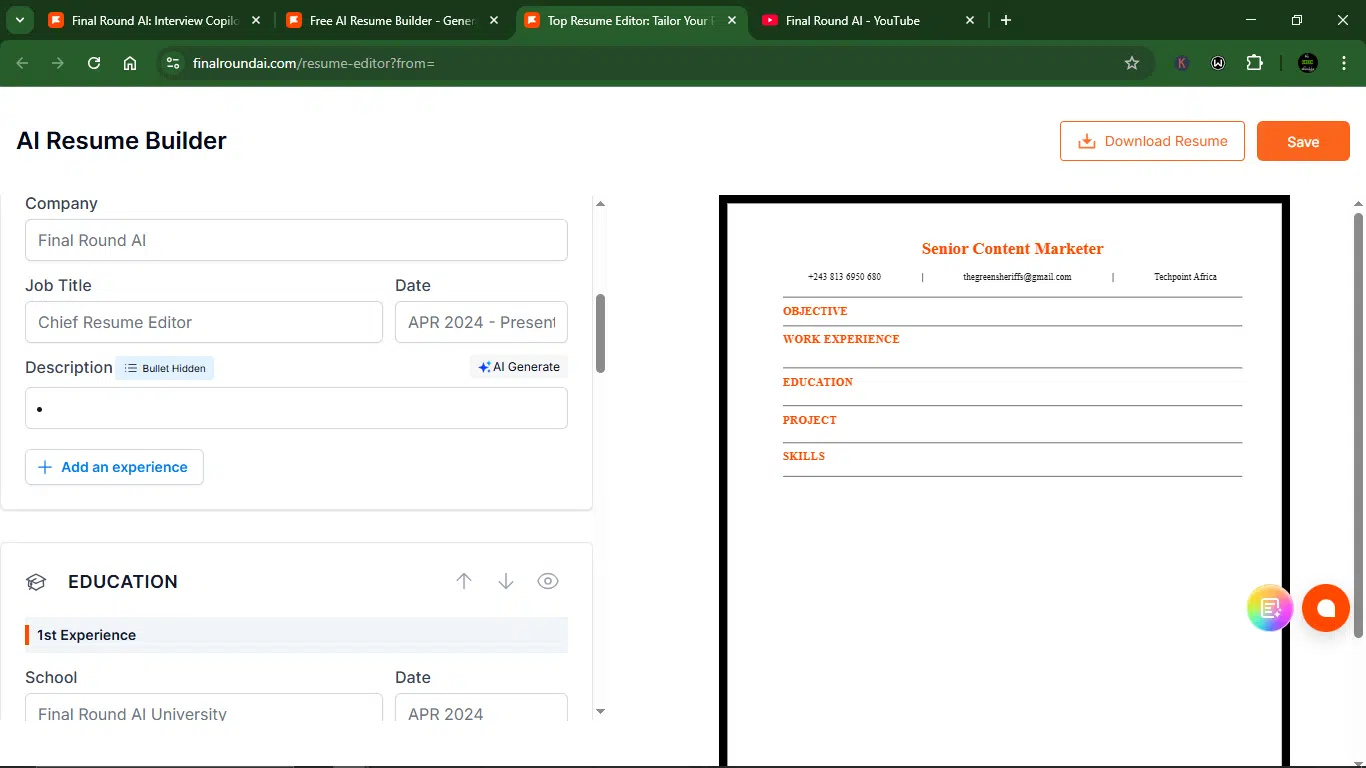
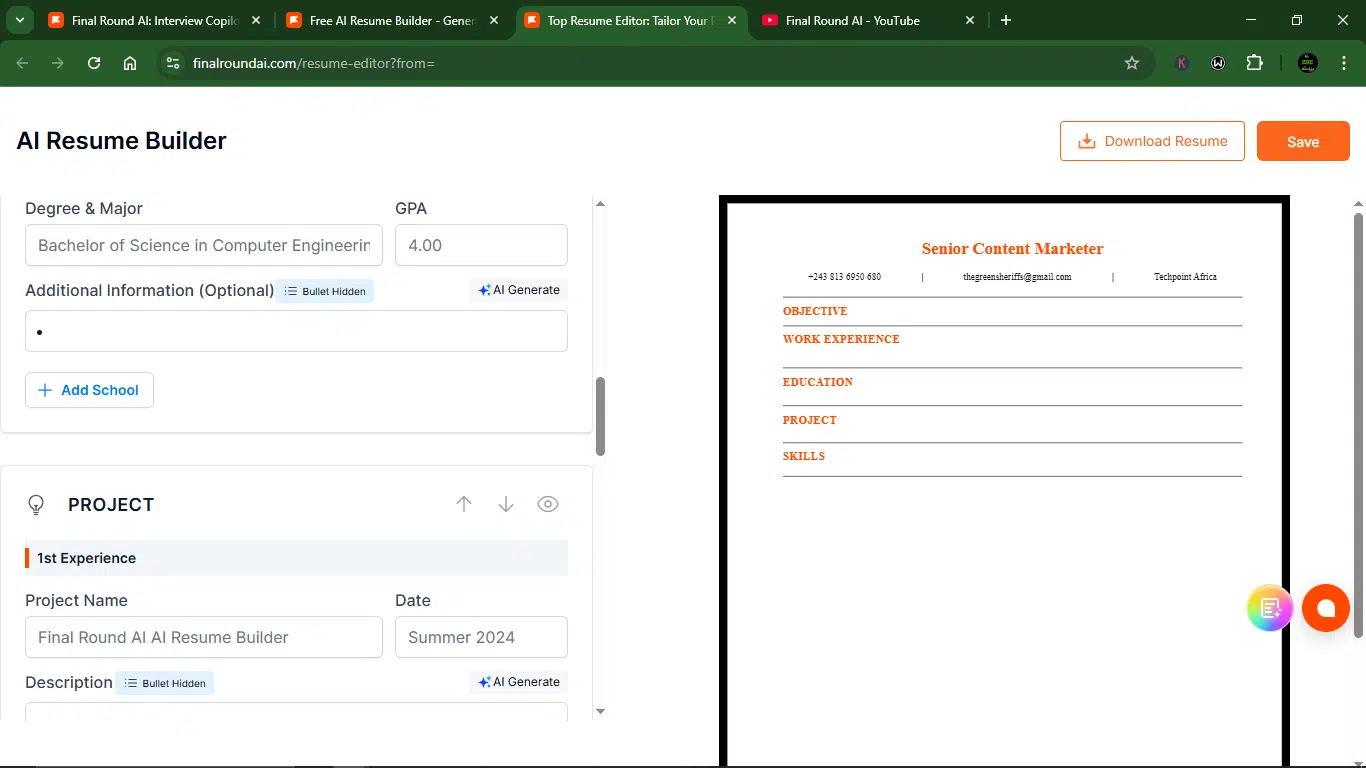
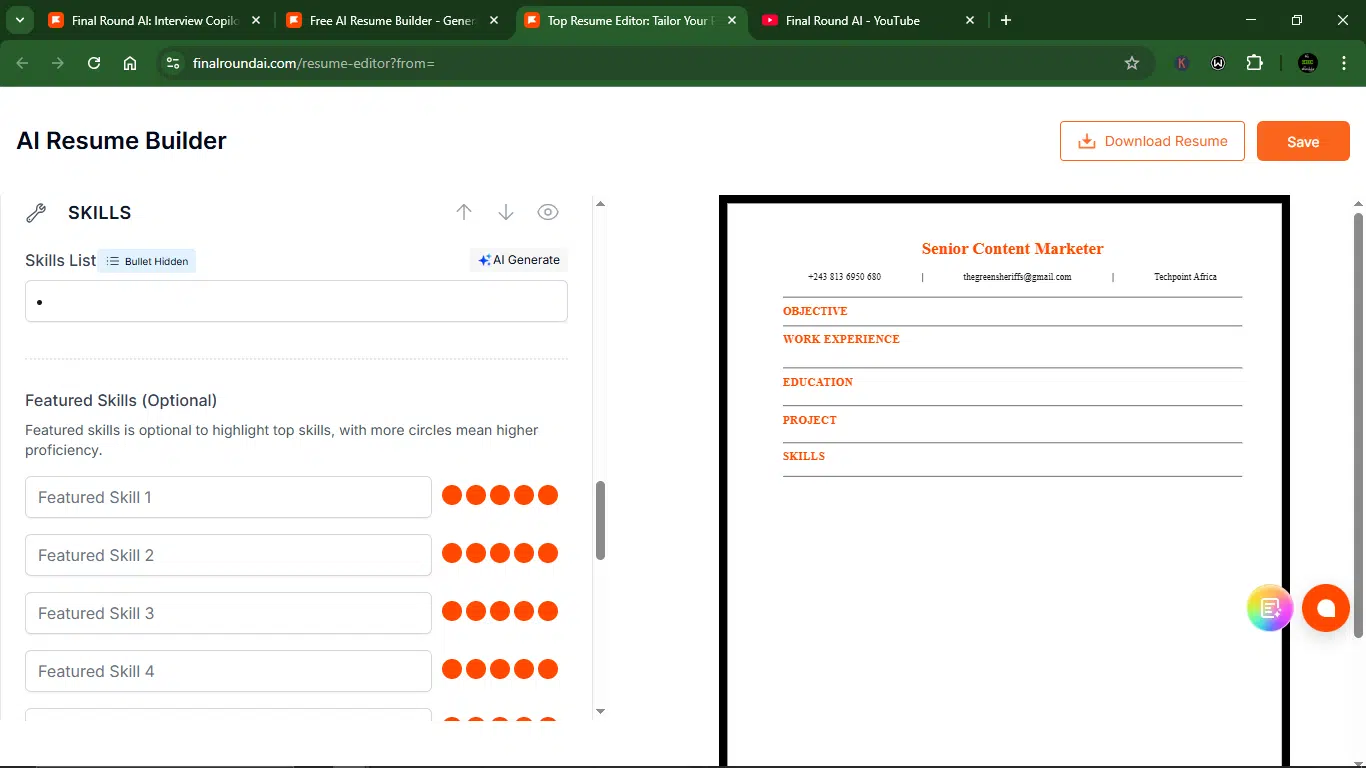
When I launched it, I was expecting a big shiny “generate” button. But no, it prompted me to enter context: my job title, past roles, project details, and skills. Once I did that, the AI helped rephrase my job experience into clean, polished bullet points that felt tailored, not templated.
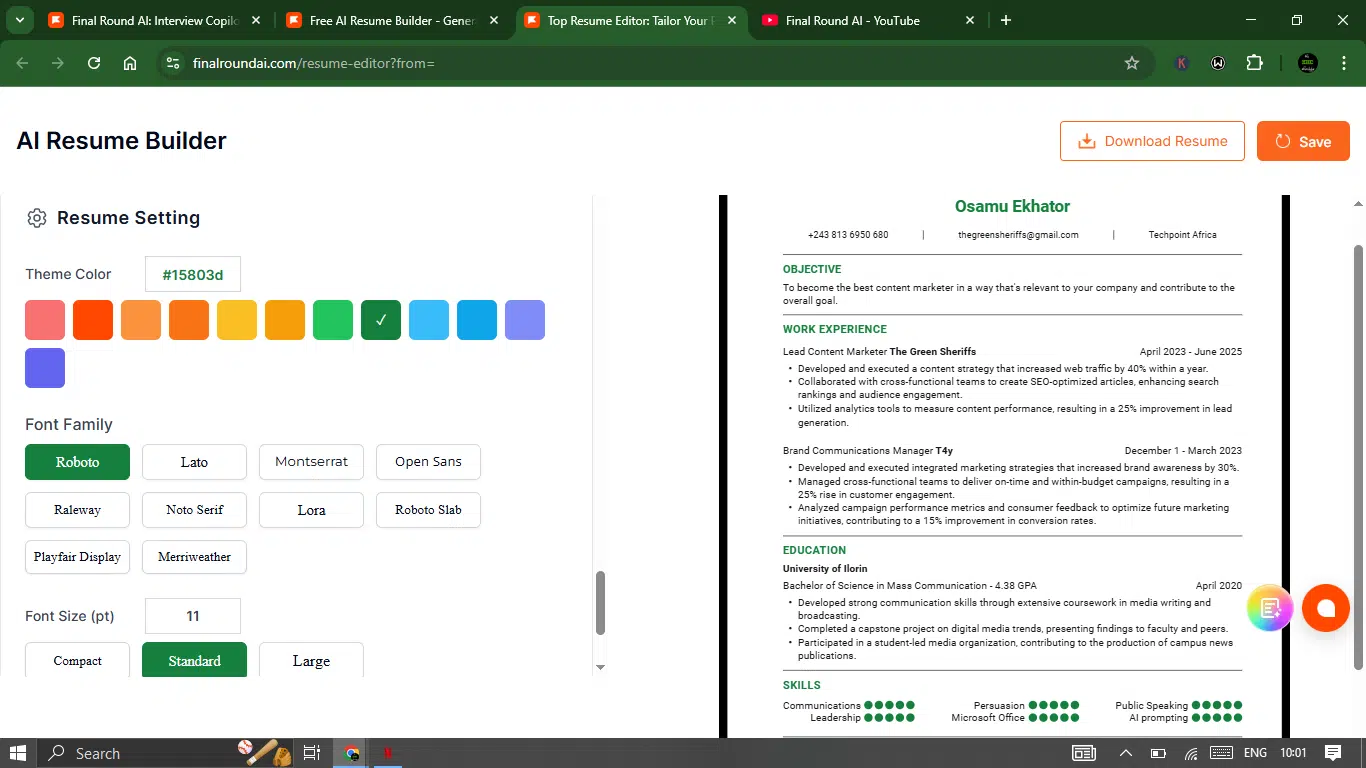
The layout included all the standard ATS-friendly sections (summary, experience, education, skills), and the builder let me tweak everything: fonts, spacing, even color schemes. I could easily customize the structure to match what recruiters typically want, without feeling boxed in.
It was oddly satisfying to see my outdated CV transform into something that felt modern and targeted. The AI didn’t just dress it up; it helped me say the same things in stronger, more confident ways.
AI mock interview
Practicing with Final Round AI’s mock interview feature turned out to be one of the most valuable parts of my testing. I kicked things off by selecting the job assessment tier, essentially telling the AI what kind of role I was aiming for.
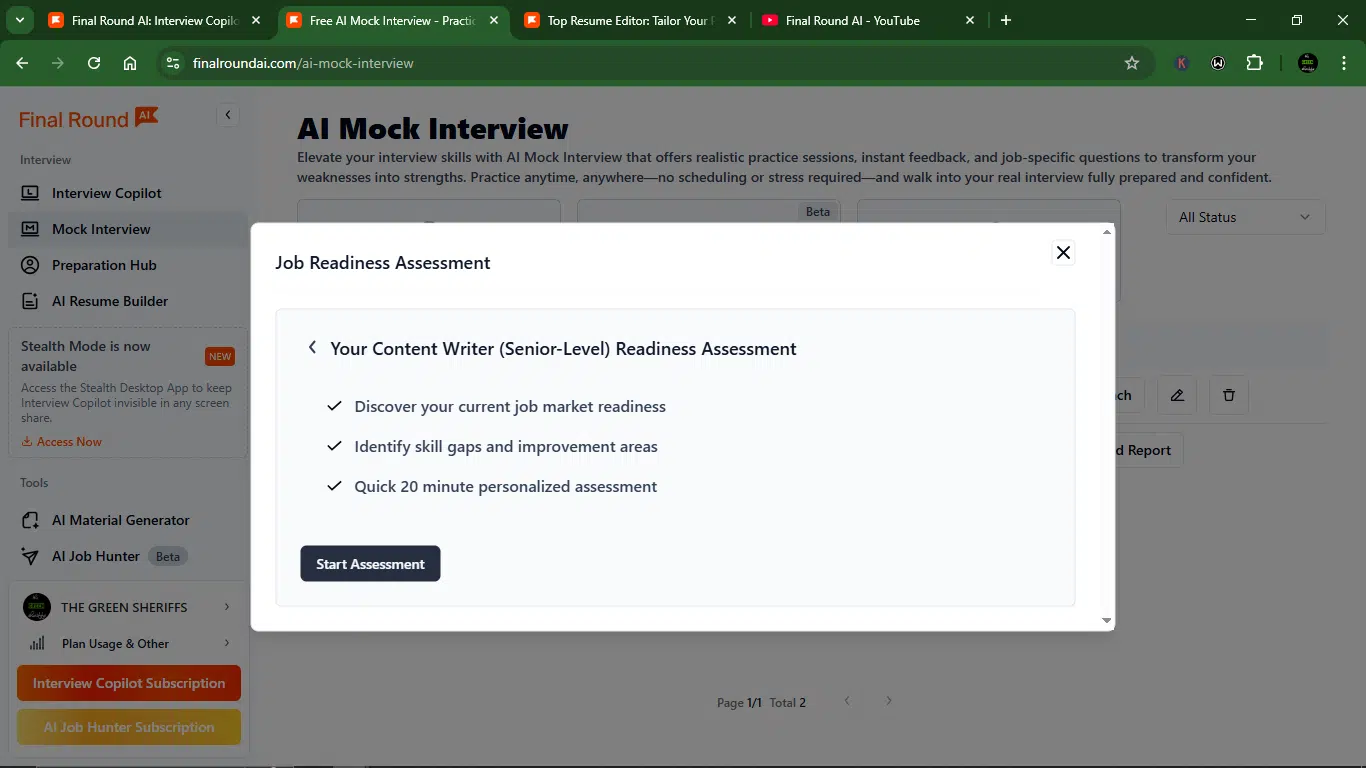
Once the session started, I was honestly impressed. The AI didn’t just throw a list of pre-written questions at me. It adapted, asking thoughtful follow-ups based on how I answered. The experience didn’t feel rigid or overly scripted; it felt dynamic. Like a real person was on the other end, guiding the conversation and watching my responses closely.
There was a hiccup during my first try; the interview ended abruptly for some reason. A tech glitch, maybe. This was the report of that first attempt:
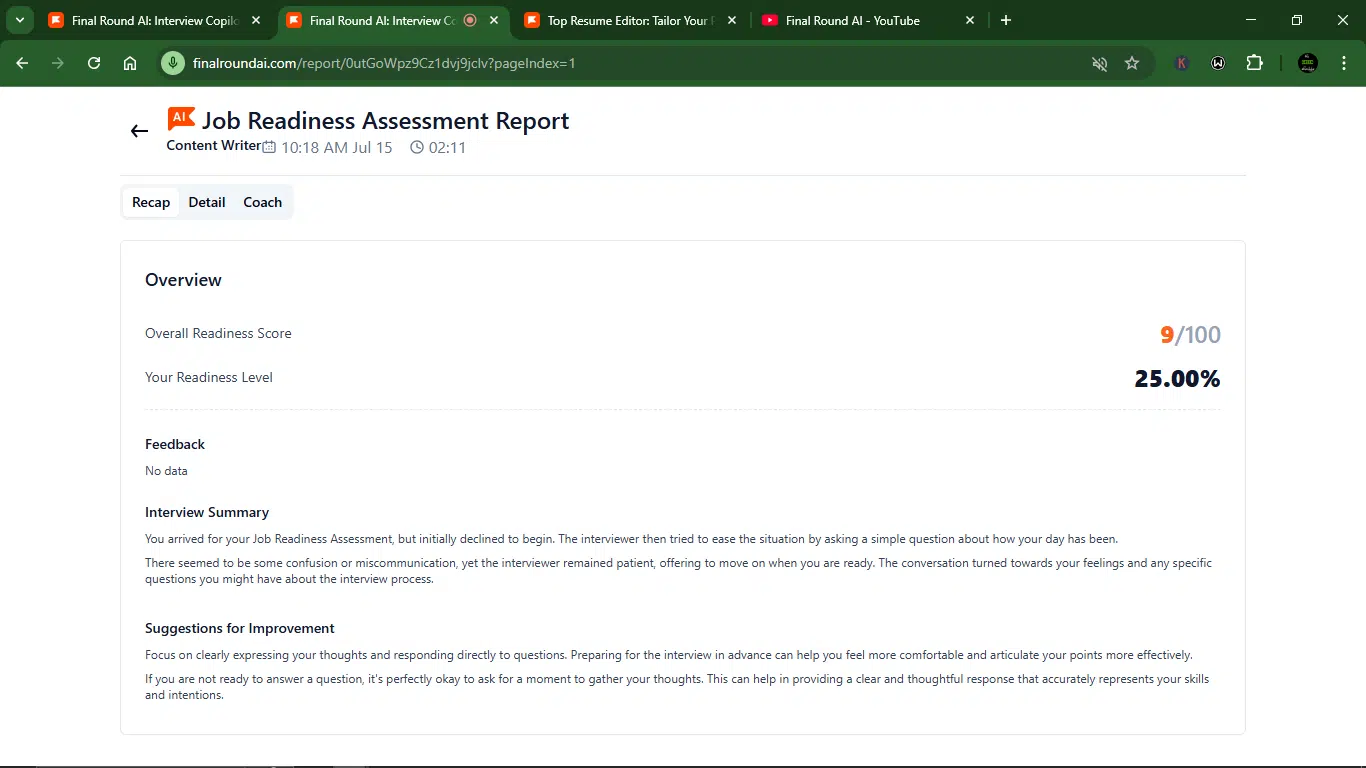
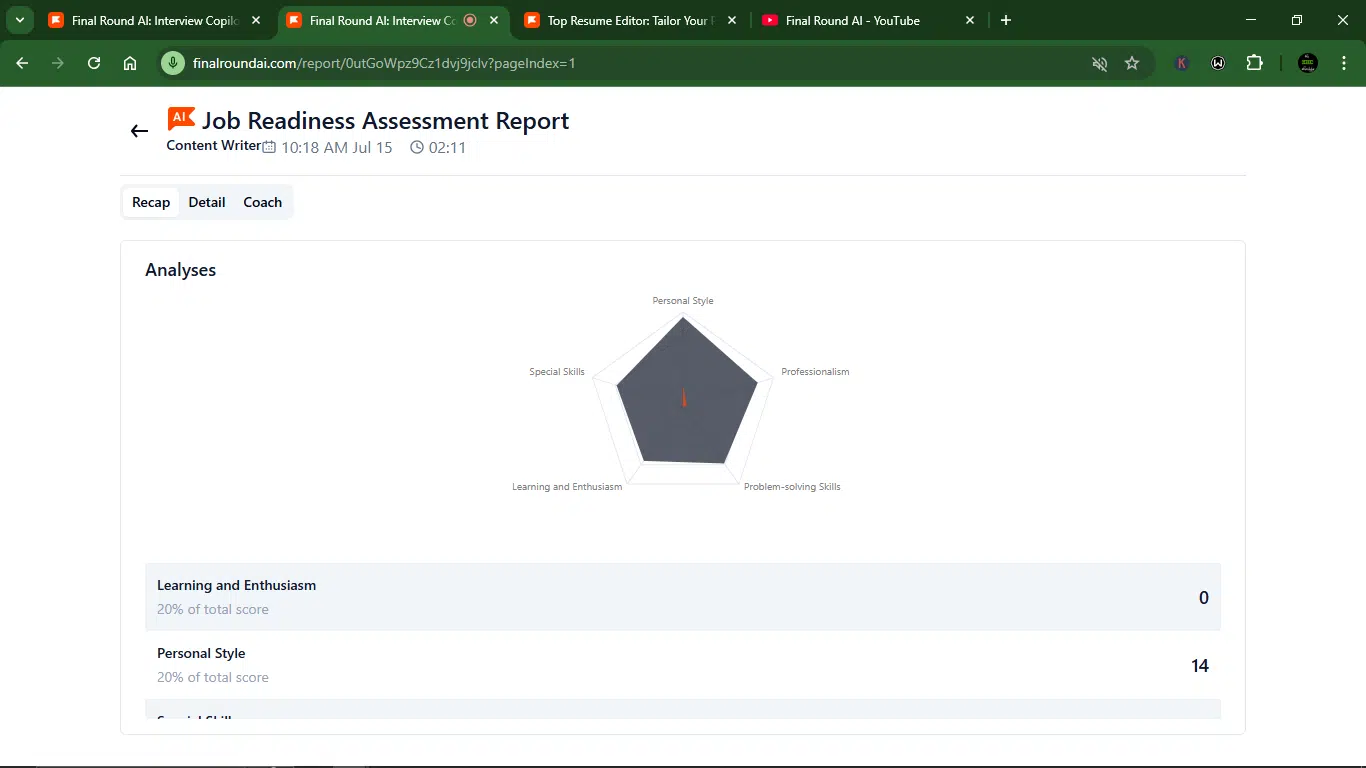
Not ideal, but I didn’t let that stop me. I relaunched it, and the second attempt went smoothly.
With the video mode on, it felt uncannily real. I was talking to a digital interviewer face-to-face, and the pressure was very real, in a good way. Alongside the interview, the tool generated a live transcript that I could refer to mid-session or after. That alone was gold.
Even better was the real-time feedback column on the right side. It highlighted filler words, pacing issues, moments where I needed to elaborate, and even gave subtle nudges to improve the clarity of my examples. And yes, it suggested answers too, but not in a way that spoon-fed responses. It acted more like a guide, nudging me to think critically.
By the time I finished that round, I wasn’t just warmed up. I felt like I’d just wrapped a full, high-stakes interview with a tough recruiter and walked away with notes.
Second phase: Testing the copilot during a job interview
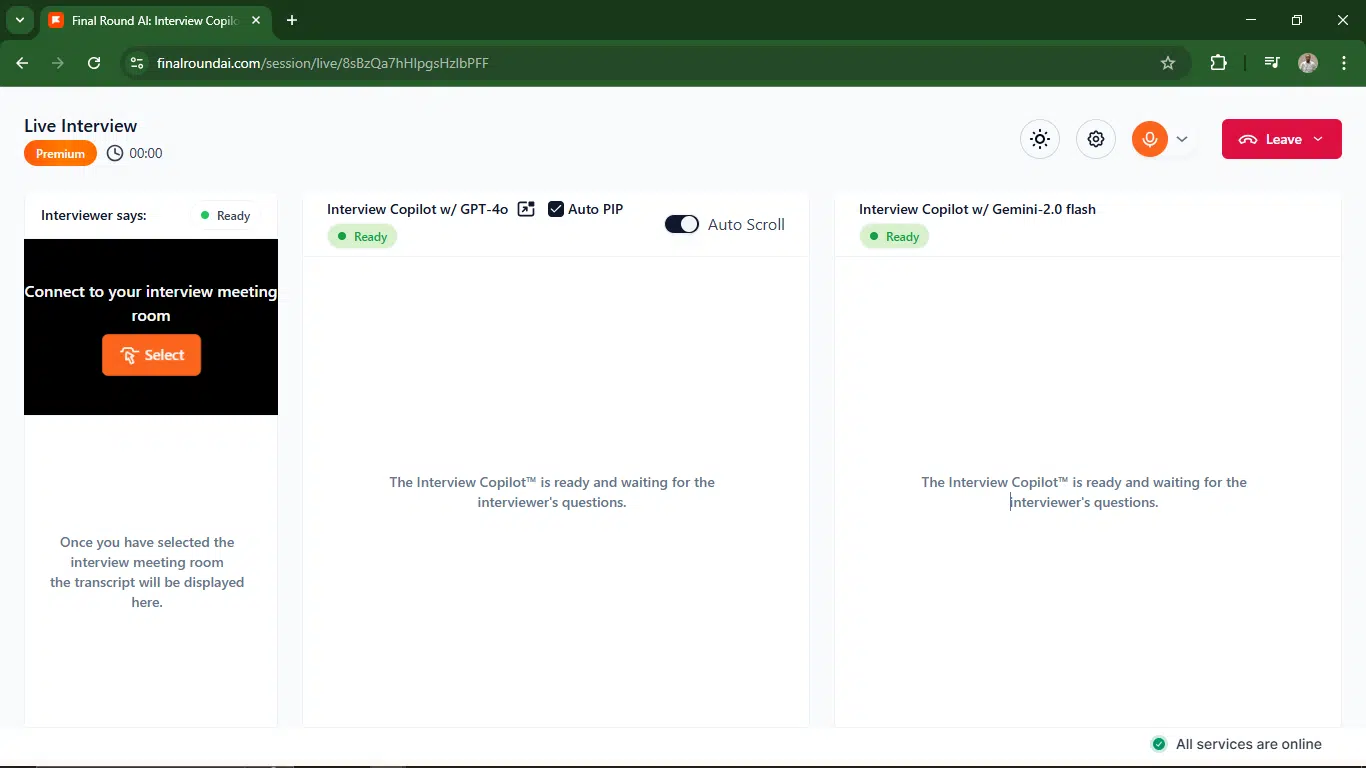
I tested the interview copilot, and within minutes, I knew this wasn’t just another gimmick. The Copilot embedded itself into the call so subtly that I nearly forgot it was there, like having a silent mentor sitting beside me, catching the details I missed, and gently nudging me in the right direction without ever interrupting my focus or tipping off the interviewer.
One of the standout features was the live transcription. Every single word from the interviewer appeared on my screen with laser-sharp accuracy. No more awkward pauses or missed details. Even with my nerves doing their usual thing, that transcription kept me steady.
A glance at the screen reminded me exactly what was asked, so I could respond confidently and in full context. It honestly felt like a safety net I didn’t know I needed until I had it. The Copilot also provided domain-specific suggestions.
By the time the interview ended, I realized I hadn’t just survived the session, I’d led it. With Copilot’s help, I responded faster, structured my thoughts better, and showed up like the version of me I usually only manage to be after the interview, when I’m replaying it in my head and thinking of better answers.
3. After the job interview
After every interview, I go into full debrief mode. If you’re like me, you know the post-interview spiral all too well: replaying every word, questioning every pause, and secretly wishing the hiring manager would just text you your score like a school test. Final Round AI makes it bearable.
Interview summary reports
Right after each session, I received a detailed breakdown of my performance. It highlighted what I did well, flagged the parts where I stumbled, and provided specific feedback I could use immediately. The report showed timestamps of strong responses and weak moments, which helped me replay those key points without reliving the entire interview in my head.
The interview analytics was gold. The platform analyzed how confident, clear, and engaging I sounded, not just what I said, but how I said it. It picked up on patterns like filler words, vague phrasing, or signs of hesitation. Now, instead of guessing what impression I left, I get real data and a clear action plan.
Question bank and practice tools
Outside the live interviews, I leaned on Final Round’s AI-powered question bank, a surprisingly nuanced collection of interview questions grouped by industry and role. The questions weren’t basic either. They pushed me to reflect, connect my experiences better, and articulate my value more clearly. You can even search by skill or topic, which helped me prep faster for different types of interviews.
Applications and use cases for Final Round AI
Final Round AI is actually built to do the work across the entire interview process. From the first draft of your resume to post-interview feedback, here’s how I found it most useful (and how you might, too):
1. Interview preparation for specific roles
Final Round AI truly shines here. Whether you’re targeting a role in product management, finance, marketing, consulting, software engineering, or even DevOps, the platform generates tailored interview questions and simulations based on that job. It gives you industry-specific drills that mirror what actual recruiters ask.
2. AI resume and LinkedIn profile optimization
Job seekers often underestimate how important it is to speak the language of the role they’re applying for. Final Round uses AI to scan job descriptions and optimize your resume and LinkedIn profile to match what recruiters and ATS systems are scanning for. This one change alone can boost your callback rate within a short time.
If you’re applying to several roles in different industries or markets, you can easily tweak your resume to suit each application, without rewriting everything from scratch.
3. Live interview support (Interview Copilot)
Final Round’s Interview Copilot feature is built for those high-stakes moments. It quietly listens during your live virtual interviews and provides suggestions, reminders, and subtle nudges, all without distracting you or alerting the interviewer.
4. Post-interview analysis and feedback
Ever wish you could rewind your interview and get feedback like a football coach breaking down plays? Final Round gives you that. It analyzes your tone, clarity, body language (if you’re on camera), and even emotional delivery to help you reflect and improve.
5. Job application automation
The auto-apply feature lets you upload your resume, pick the kinds of jobs you want, and let the tool match you with relevant openings. It even fills in custom application content like summaries or cover letter snippets.
6. Ongoing career coaching and accountability
The AI career coach helps you plan weekly goals, gives you mini-tasks, and tracks your progress across multiple applications and prep sessions. If you’re someone who starts strong but loses steam halfway through a job search, this helps keep your momentum up.
Pros and cons of using Final Round AI
What I liked about Final Round AI
1. It’s an actual all-in-one job-hunting tool.
Most tools I’ve used in the past felt like puzzle pieces that didn’t quite fit together. One would help tweak my resume, and another would throw mock questions at me, and neither of them communicated with each other. Final Round AI changed that.
Here’s how:
- My resume edits directly influenced my mock interview prompts.
- My LinkedIn summary updates informed how I framed certain answers.
- My job applications were tracked and analyzed by the same tool.
It felt like one platform that understood the full job search cycle.
2. It’s fast
No lag. No loading wheels of doom. The platform ran smoothly, which matters a lot when you’re mid-practice or trying to shake off anxiety before a real interview. Responsiveness like that keeps your rhythm in check.
3. It felt human
Final Round’s tone was natural, the suggestions felt empathetic, and the feedback was constructive. It even supported audio and video responses, which made the mock interviews eerily realistic (in a good way).
4. It offers hyper-personalization
Final Round didn’t treat me like a generic “job seeker.” It adapted based on my role, industry, and goals. Whether I was prepping for a software engineering interview or testing out product management roles, the questions and feedback felt on target every time.
5. It gives in-depth, real-time feedback
It wasn’t just about “good” or “bad” responses. Final Round broke down my answers based on clarity, confidence, pacing, and relevance. It even flagged my non-verbal cues, like posture and eye contact, during video interviews.
6. You can track your progress
The platform gives visual reports so you can track what’s improving and what still needs work. It’s motivating when you can see your confidence score rise over time.
7. Always available.
Unlike a human coach, Final Round doesn’t need sleep. You can prep at 2 a.m. in your pajamas, and it’ll still give you great feedback without judgment.
What I didn’t like about Final Round AI
1. The pricing might scare some people off.
Final Round AI isn’t the most affordable option out there. While I saw value, I still think they could offer a bit more on the free plan. The trial is short, and the Basic tier lacks access to key tools like Interview Copilot and advanced analytics, which are the real MVPs.
2. It’s not mobile-first yet.
If you’re the type who likes to prep on your phone while commuting or waiting in line at a coffee shop, you might be disappointed. The platform runs smoothly on desktop, but it still needs better mobile optimization.
3. It can feel overwhelming at first.
A lot is going on inside Final Round. Resume tools, Copilot, mock interviews, job tracking, and coaching dashboards. For someone who’s never used an AI job prep platform before, it might feel like stepping into the cockpit of a spaceship. A simplified onboarding mode for beginners would go a long way.
4. It offers limited depth for niche or creative roles.
If you’re applying for roles like a creative director at an indie gaming studio or a policy advisor for international NGOs, you may find the mock interview questions a bit too generic. The tool is best suited for more structured roles in tech, business, and consulting.
6. There’s a slight learning curve if you’re new to AI tools.
If you’re brand new to AI or digital prep tools in general, there’s a tiny learning curve. Not unmanageable, but something to be aware of — especially if you’re under time pressure for an upcoming interview.
Final Round AI pricing
| Plan | Price | Key features |
| Basic | $0 | Limited Interview Copilot (4 sessions/month)Virtual Interviews only Limited Mock Interviews and Reports Limited Resume Builder, Career Coach, Auto Apply, and Question Bank Limited access to support |
| Plus | $148/month | Unlimited Interview Copilot sessions Interview types: Virtual only Unlimited Mock Interviews, Reports, Resume Builder, Auto Apply (15 jobs), Career Coach, Question Bank Interview Q&A flashcardsSpeak with recruiters Cover Letter Generator Chatbot + Email Support |
| Pro | $96/month (billed quarterly) | Everything in Plus, and:Expanded Interview Types: Phone, Coding, HireVue Stealth Mode desktop app Auto Apply to 50 jobs in the first month 1:1 Tech Support Priority Access During Peak Hours |
| God Mode | $81 / Month (billed semi-annually) | Everything in Pro, and: Best price per month Designed for serious job seekers needing consistent support over time |
| Scholarship | Scholarship Program | Same benefits as God Mode For eligible candidates Application required |
Who should use Final Round AI?
1. Job seekers at any level
Whether you’re gunning for an entry-level role or eyeing a senior position, Final Round AI adapts to your experience. The platform tailors mock interview questions based on your resume, job description, and industry, thereby giving you the kind of focused practice that moves the needle.
2. Students and recent graduates
If you’re navigating your first few interviews and wondering what recruiters even want, Final Round gives you a safe space to practice, get feedback, and build confidence. No judgment. Just growth.
3. Career changers
Switching from one career path to another, Final Round AI helps bridge the gap by simulating interviews in your new field and prepping you with industry-specific lingo, expectations, and frameworks.
4. Non-native English speakers
This one is big. The platform’s repeatable video/audio mock sessions help you polish your fluency, articulation, and pacing. It’s like having a virtual language and confidence coach wrapped in one.
5. Remote job applicants
Virtual interviews are the new normal, and Final Round’s format mimics that reality. Whether you’re doing Zoom, Meet, or audio-only calls, you can practice in those exact environments, complete with real-time transcription and coaching.
6. Anyone feeling stuck or overwhelmed by job hunting
Applying, prepping, waiting, and repeating is exhausting. If you’ve hit a wall or feel like you’re doing everything right but still getting ghosted, Final Round AI can bring some clarity and structure. It doesn’t just simulate interviews; it helps you refine your strategy from resume to follow-up.
How to make the most of Final Round AI (5 tips)
If you’re going to invest time (or money) in a tool like Final Round AI, you might as well squeeze every drop of value from it. After using it extensively, here are four tips I wish someone had told me before I started:
1. Don’t skip the resume builder
I know it’s tempting to dive straight into mock interviews, but trust me, your resume sets the tone for everything else. The AI uses your resume and job description to personalize questions and coaching tips. If your resume is vague or outdated, your whole experience will feel a little off. Let the builder clean it up first.
2. Practice in the mode you’ll be interviewed in
If your real interview is on Zoom or Google Meet, practice in video mode. If it’s audio-only, replicate that too. One of the smartest things I did was mimic the exact format of upcoming interviews; it made the real thing feel familiar instead of nerve-wracking. Final Round’s different modes (video, audio, or chat) are there for a reason. Use them.
3. Use the Interview Copilot during actual interviews
It’s smart prep with a silent coach in your corner. Copilot won’t spit out robotic answers, but it will keep you calm, focused, and structured. During one of my real interviews, it subtly reminded me to use the STAR framework. I adjusted on the fly, and the response came out ten times stronger.
4. Dive into the post-interview reports
After every session, the analytics and sentiment analysis feel like a cheat code. It’s easy to gloss over them in excitement or frustration, but those insights (what you nailed, what you flubbed, how confident you sounded) are gold. Track your growth over time. The more you review, the sharper you become.
5. Pair it with job applications
Final Round is also great for tracking and streamlining your applications. The auto-apply feature and LinkedIn optimizer saved me hours. Don’t treat this as just an interview coach; it’s a full-suite job-hunting companion. Let the AI do the heavy lifting so you can focus on being your best self in interviews.
How Final Round AI compares to competitors
After using FinalRound AI myself, I got curious. I wanted to see what else was available for interview prep and AI-driven coaching. It turns out, there’s a whole ecosystem of tools, each with its niche.
Here’s how Final Round compares to the five major alternatives:
Final Round AI vs. Job Bridge
Job Bridge feels more like a career transition buddy than just a mock interview tool. While FinalRound focuses on performance feedback through AI, Job Bridge offers a more rounded experience with human coaching built in.
If you want someone to hold your hand through resume rewrites, job matching, and interview coaching, Job Bridge might feel warmer and more personal, especially if you’re just starting or switching careers. But if you’re already in motion and just need precise interview performance insights, FinalRound gets to the point faster.
FinalRound AI vs. Verve AI
Verve AI plays in a different lane. It’s geared toward soft skills (tone, empathy, confidence) and gives feedback on things like how warm or robotic you sound. For non-native English speakers or folks in sales, customer service, or hospitality, this is gold.
FinalRound, on the other hand, is more resume-driven and job-role specific, focusing on how well you articulate experience and tackle structured questions. It’s less emotional, more analytical. So the better pick depends on what kind of interview readiness you’re after.
FinalRound AI vs. Interviewer.AI
Interviewer.AI isn’t really for candidates; it’s for companies screening candidates. It’s great if you’re on the hiring side, looking to automate your first-pass interviews.
But if you’re a job seeker looking to improve, this one’s not built with you in mind. FinalRound wins here by being candidate-focused from the ground up, especially for people preparing for tech and product roles.
FinalRound AI vs. Skillora.ai
Skillora is fun and interactive. It’s like a gamified bootcamp for role-specific practice. It allows you to simulate real-world scenarios and get AI-generated feedback on the spot. I can see this being useful if you’re prepping for niche tech jobs (e.g., DevOps or cybersecurity) and want something more playful than formal. FinalRound feels more polished and career-focused, while Skillora brings more practical energy. If FinalRound is a coach, Skillora is a lab partner.
Final Round AI vs. Pramp
Pramp is arguably the most human of them all. You’re matched with another job seeker and practice interviews in real time. It’s free, it’s raw, and sometimes awkward, but it’s also real-life practice you can’t fully simulate with AI. Where FinalRound shines in structure, analytics, and feedback, Pramp offers social realism and adaptability.
| Tool | Key use | Format | Feedback style | Ideal for | Pricing |
| FinalRound AI | Smart AI mock interviews based on your resume | Video, Audio, Chat | Real-time performance scoring | Solo job seekers in tech/product roles | Free plan + Paid (from $99/mo) |
| Job Bridge | End-to-end job prep with a human with AI coaching | Mostly Video | Hybrid: AI + human coach feedback | Career changers, fresh grads | Subscription (by request) |
| Verve AI | Train soft skills & body language for interviews | Video w/ analytics | Emotion + tone analysis | Non-native speakers, customer-facing workers | Free trial + Paid (from $49/mo) |
| Interviewer.AI | Company tool for screening & skill matching | One-way video | Recruiter-style scoring | Hiring teams + recruiters | Business pricing (~$100+/mo) |
| Skillora.ai | Role simulations with AI-based advice | Interactive chat + assessments | Simulated feedback based on roles | Tech folks & niche roles | Freemium + Paid (~$25+/mo) |
| Pramp | Peer-to-peer live mock interviews | Live 1-on-1 calls | Human peer feedback + optional scoring | Coding interviews, real-time practice | Free (with upgrade options) |
Conclusion
After spending some time with Final Round AI, the tool might not magically land you a job, but it will make you a stronger, sharper, and more confident candidate.
What stood out to me was how the tool mirrored the actual job-hunting experience. The anxiety, the preparation, the uncertainty, the desire to improve, it captured all of that and offered real-time, actionable help. From crafting a resume that recruiters want to read, to getting non-awkward feedback on my interview posture, Final Round AI felt like a proper personal career coach.
It’s not perfect. I wish the mobile experience were better. I wish the pricing felt a little more generous. And no, it’s not a replacement for real human mentorship or deep industry-specific coaching. But if you’re tired of prepping alone, second-guessing yourself, and patching together resources from 10 different platforms, Final Round AI is worth checking out.
FAQs about Final Round AI
1. Is Final Round AI actually helpful?
Yes, I found it genuinely helpful. Final Round AI is great for anyone actively preparing for job interviews. It offers realistic mock interviews, personalized feedback, and tools that fine-tune both your verbal and non-verbal communication.
2. Is Final Round AI free to use?
Sort of. You get a free account to test things out, which is enough time to explore most features, but it’s limited. But to unlock the full suite, like the Interview Copilot, analytics, and custom question banks, you’ll need to subscribe. Plans start at $81 per month.
3. Can I cancel my final round AI subscription?
Yes, you can cancel anytime from your account settings. Just be sure to do it before your next billing cycle if you don’t want to be charged.
4. Is Final Round AI trained on real interview data?
Absolutely. Final Round AI is trained using thousands of real-world interview scenarios across multiple industries. That’s why its mock questions and feedback feel surprisingly spot-on. It understands recruiter expectations and mimics real hiring conversations really well.
5. Is FinalRound AI safe to use with personal data?
Yes, according to its privacy policy. Your resume and interview recordings stay private and are encrypted. Final Round doesn’t share your information without your consent, which is comforting in a world where data privacy is a constant worry.
6. How big is Final Round AI on privacy?
Pretty big, from what they claim. The platform claims it doesn’t store interactions long-term or keep permanent records. If you’re privacy-conscious (like I am), that’s a big green flag.
7. AI vs. human coaching: Which is better?
It depends on what you need. Human coaches bring nuance, empathy, and deep insights. AI offers instant feedback, 24/7 access, and no judgment. Final Round AI strikes a decent balance, especially if you’re looking to practice independently before investing in human coaching or as a supplement to it.
Disclaimer!
This publication, review, or article (“Content”) is based on our independent evaluation and is subjective, reflecting our opinions, which may differ from others’ perspectives or experiences. We do not guarantee the accuracy or completeness of the Content and disclaim responsibility for any errors or omissions it may contain.
The information provided is not investment advice and should not be treated as such, as products or services may change after publication. By engaging with our Content, you acknowledge its subjective nature and agree not to hold us liable for any losses or damages arising from your reliance on the information provided.
Always conduct your research and consult professionals where necessary.

